 By Ray Rivers By Ray Rivers
June 3rd, 2016
BURLINGTON, ON.
Both the Liberals and Conservatives held national conventions recently and there was lots of news coming out of both. In Vancouver the Conservatives seemed to have taken a breath of fresh air as they brought the Harper-era to an end, and were even encouraged by their former leader to reflect on the future and not the past. Though this is the party which claims its historic past to include the title of Canada’s first government.
In fact, it was called the Liberal-Conservative party back then, and it became a little more liberal when a few members of the left-wing agrarian-based Progressive party forced the name change to Progressive Conservative in the 40’s. But then the PC party self-destructed in the 90’s and what was left of it later dissolved itself, and turned the corner sharply with a precipitated marriage to the right-wing Reform party. So it isn’t really the party of Sir John A or Diefenbaker or even Mulroney anymore.
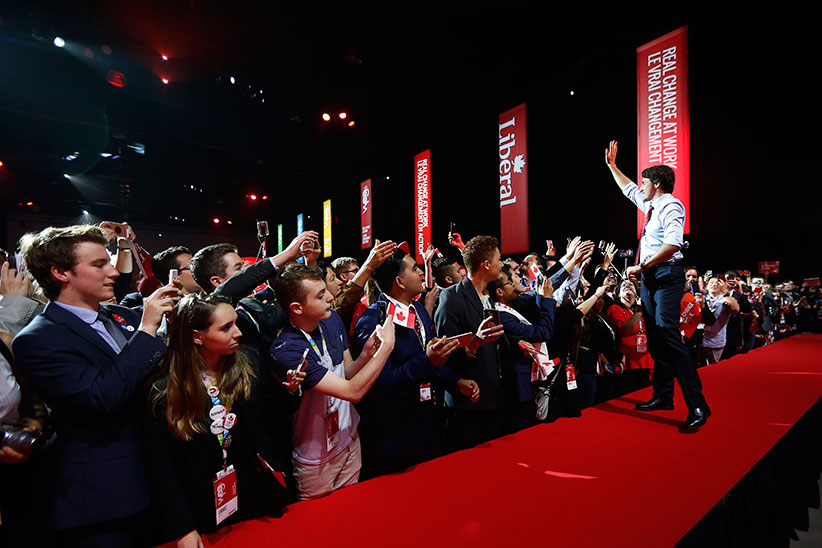 Prime Minister Justin Trudeau greets delegates at the 2016 Liberal Biennial Convention Winnipeg Saturday, May 28, 2016. Was it a political party convention or a meeting of a movement? Macleans/John Woods But at least it’s still a political party. The Liberals left their convention in Winnipeg with a new constitution that has put an end to membership fees and memberships. You can register as a Liberal but not as a member. It appears that Liberals don’t want to belong to any club that would accept them as members. But that doesn’t mean the new Liberal movement doesn’t want your money, as anyone who has ever received an email from them will attest.
It all has to so with research which shows that the latest generation of mainstream Canadian adults don’t go in for that old membership routine, but love the idea of being in a movement. Besides the $10 membership fees cost more to administer than they brought in, and then there are all those tiresome volunteer hours and membership drives. And if membership fees were really about making money the other parties would be thinking, as the Tories briefly did, about a more realistic $25 a year – similar to what the NDP charge in Ontario.
Mr. Trudeau has been extremely successful, at least so far, in challenging conventional wisdom. Imagine winning an election by campaigning on welcoming refugees, deficit spending and higher taxes for the rich. What about the decision to allow those 300,000 Liberal non-member supporters the right to participate in choosing the next leader – which happened to be Trudeau. And didn’t he shock the world with the free world’s first gender-balanced Cabinet, despite the critics.
One of the most applauded and condemned election promises we’ll see implemented this election term is changing how we elect our government. Of course this initiative is damned by the Conservatives, because the first-past-the-post system works best for a party which can only win when there are electoral splits among the other parties at the polls. And changing the system is applauded by all of the the other political parties for exactly the same reason – to keep the Tories out of office.
Mr. Trudeau’s right hand woman on the issue, Democratic Reform Minister Maryam Monsef, has struck a committee to examine the facts on the options. One of those options will be proportional representation (PR), the most common democratic system in the rest of the free world. Under proportional representation some MP are elected to represent their ridings (as they are now) and the rest are appointed based on the percentage of the popular vote their party obtained in the last election.
These latter MPs are often referred to as list MPs since they are appointed from a list of candidates developed by the party based on their qualifications and loyalty to the party. Should that option be implemented, and it’s currently not the favourite among the PM and his brain trust, a PM Trudeau may have difficulty convincing Canadians that his list of non-riding MPs are even Liberals, since they will not be members. Everyone is still waiting to see how the non-Liberal senators will perform in the Senate.
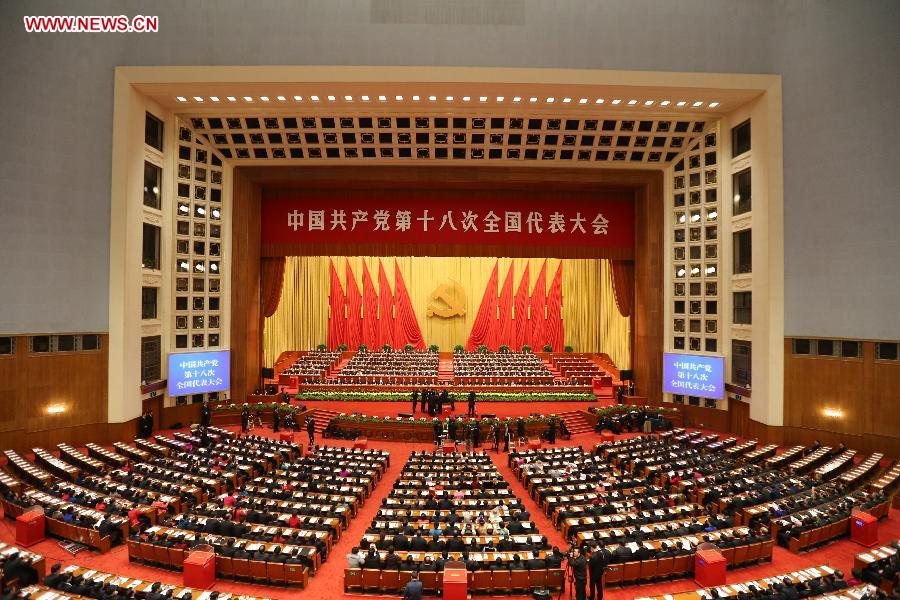 This is a political party. It is a picture of the Chinese communist party. Orderly. Can there be a party without members? Even in China and Cuba the communist parties have members. Except that in China one can’t just buy your way into the party with a membership fee – you have to be accomplished and worthy. In fact only one in sixteen Chinese who apply get qualified to be party members. Nevertheless there are almost 88 million communist party faithful there, almost three times Canada’s entire population.
But since almost all top government positions in China are staffed with party members, it just makes sense to try and get in the club. Now I’d have to call 88 million members a movement, even in China with its over billion souls. So it begs the question, as we reflect on our changing political scene, is that where our new PM is heading? One has to recall his one-time remarks a couple years ago about admiring the government of China.
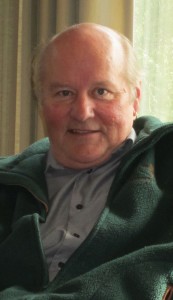
Ray Rivers is an economist and author who writes weekly on federal and provincial issues, applying his 25 years of involvement with federal and provincial ministries. Rivers’ involvement in city matters led to his appointment as founding chair of Burlington’s Sustainable Development Committee. He was also a candidate in the 1995 provincial election
Background links:
Conservative Party – Conservative Convention – NDP Membership Fees –
Proportional Representation – Liberal Membership – Trudeau Liberals –
Trudeau and China –

 By Staff By Staff
June 3, 2016
BURLINGTON, ON
The Member of Parliament for Burlington rose to speak on the House of Commons about the matter of electoral reform – changes to be made in the way Canadians elect their Members of Parliament.
Mr. Speaker, I am pleased to rise today to participate in this important and historic debate on the establishment of a special all-party committee on electoral reform. This is an issue that affects all Canadians, and I am glad to see such strong principles proposed in the amended motion to guide this committee’s study.
I wish to spend my time today discussing some of the changes to our electoral system that have been introduced over the past century; changes that at the time were seen as rather dramatic alterations to our system.
Many of these reforms, however, are now looked back upon by Canadians as moments of true progress in the history of our great democracy.
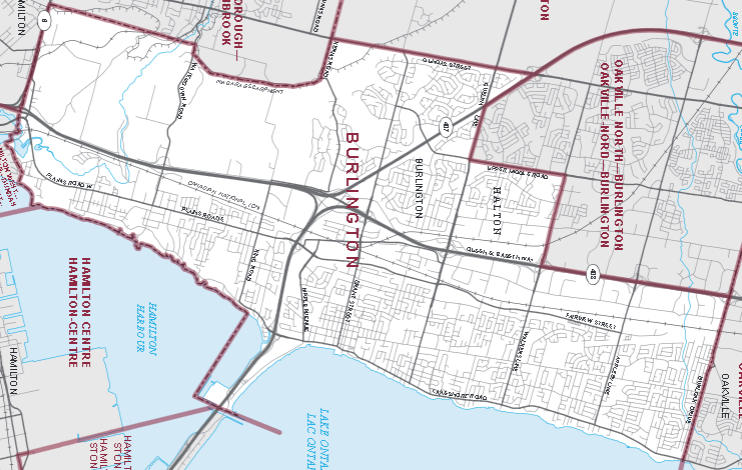 Boundary for the constituency of Burlington The electoral system we have today is the product of almost 150 years of evolution. The election we saw in October was quite different from elections upon Confederation, when only a fraction of Canadians, namely land-owning men, had a say in our democratic institution.
Our government’s pledge to replace the first past the post system is just another step in this historical evolution to a more inclusive, efficient, and stronger electoral system for all Canadians.
Allow me to begin in 1920, over a half century after Confederation.
After 50 years of elections in this country, Parliament established the Office of the Chief Electoral Officer. It was not until 1927 that the Chief Electoral Officer was appointed by the House and not the government. These were seen as quite major changes at the time, but they are ones we can all look back on, knowing they have helped lead to nearly a century of trusted and independent electoral administration in this country.
It was not until 1964, nearly a full century after Confederation, that Parliament introduced independent electoral district boundary commissions to draw riding boundaries, bringing an end to gerrymandering. Prior to this, the government could simply decide who got to vote where, with little recourse for individuals, communities, or opposition parties. This is another instance of what was once proclaimed to be a fundamental change to our electoral system. In hindsight, we see that this reform has helped build trust among Canadians that our electoral system has integrity, that it is fair, and that all communities have a voice.
 Karina Gould accepting congratulations from former MP Mike Wallace the night of the last federal election. In our ever-evolving system, parties only began registering with Elections Canada in 1970, and they only became subject to election spending limits in 1974. After a century of elections, Parliament significantly altered our politics by removing the role of big money in our elections. I truly believe our democracy is stronger because of that, but once again, it was an area of contentious debate at the time. Today, the idea of unlimited spending in an election would be quickly dismissed by Canadians as a barrier to the level playing field we hold dear for free and fair elections. We are proud that our elections are based on ideas and debate, and not simply dollars.
I have spoken briefly of some reforms to the electoral system itself, but I would like to turn now to the increasing franchise over the years; a clear example of how far our electoral system has progressed since Confederation.
Allow me to return back to the 1920s, when elections in this country were decentralized and run under a hodgepodge of provincial statues.
In the 1920s, the federal legislation deferred to the provinces in allowing disqualifications on the right to vote for “reasons of race”. This provision worked to disqualify many Canadians, including those of Chinese, Japanese, and Ukrainian descent, among others. However, it was not until 1948 that Parliament deleted references to disqualification on the basis of race. It was not until 1950 that Parliament allowed the Inuit the right to vote, and it was not until 1960 that Parliament allowed first nation people the right to vote without forcing them to give up their status or home on a reserve.
Expanding the franchise was divisive at the time. Today, however, we look back and simply wonder what took Parliament so long to recognize the rights of all Canadians in exercising their vote.
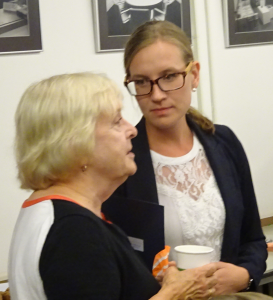 Karina Gould listening to a constituent. Women were not able to vote until legislative changes were enacted in 1918.
Those individuals living in poor houses or the homeless were not able to vote until 1929. War objectors were not able to vote between 1938 and 1955.
It was only in 1970 that the voting age was lowered to 18 from 21.
What I am trying to get at is that, when we reflect on these developments without the partisan frames in which they were originally debated, we see reforms that uphold and correspond to our values as Canadians; we see reforms that uphold the rights of all Canadians; and we see reforms that strengthen the bond between the people and the government and that instill trust that the government is formed by the true democratic will of all Canadians.
It is almost incomprehensible that we could ever exclude a full 50% of society from the franchise, that we could exclude indigenous peoples, ethnocultural minority groups, and those who dared to express different beliefs from those of the government of the day. While I am certainly not proud of the history of disenfranchisement in Canada’s electoral history, I am truly proud of how far our democracy has evolved into a more inclusive system for all Canadians.
Electoral reform is the next step in this evolution toward a more inclusive system. We can build a better system that provides a stronger link between the democratic will of Canadians and the election results, one that motivates Canadians to take part, one that reflects our collective values of fairness, inclusiveness, gender equity, openness, and mutual respect. To get there, the process leading to reform must also embody these values.
Parliamentarians will need to set aside partisan interests and engage in a thoughtful and substantive dialogue with each other and with citizens.
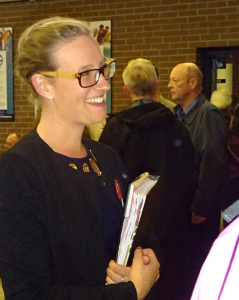 Karina Gould during the federal election debates in Burlington. I strongly believe that stepping away from the first past the post system and embracing a new system that can reflect these values and the values articulated in this amended motion would be another milestone in the history of Canada’s elections. I suspect future generations will look back at the reforms proposed in this motion and reflect on them, as I have done today with past reforms. I suspect they will note this is yet another example of how our electoral system has evolved to further increase the inclusion of all peoples, to better reflect the will of voters and the representation of the House, and to work toward a system that produces a House that looks more and more like the faces of Canadians.
I hope all members will join me and support the creation of this committee.

 By Ray Rivers By Ray Rivers
May 27th, 2106
BURLINGTON, ON
 A significant document that few have actually read. CBC and National Post political contributor Rex Murphy rants that Ontario Premier Wynne’s climate change strategy is her own version of LEAP. He is referring to the LEAP Manifesto shepherded by author and political activist Naomi Klein and best-friend film maker Avis Lewis. The document came out last year during the federal election, and was presented at the NDP convention earlier this year. It is a strategic document, laying out long term goals for achieving a more harmonious, equitable, and environmentally friendly Canada in the age of global warming.
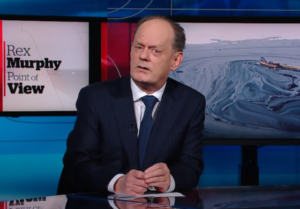 Rex Murphy – National Post columnist – CBC on air personality. Rex Murphy apparently considers those goals the equivalent of leaping into hell, as he accounts that, in his view, it would be political and economic suicide to stop using fossil fuels. One wonders if he had actually read the LEAP document as he spreads his hyperbolic poison over a topic he clearly doesn’t understand, and for an issue which he is clearly out of touch with the majority of Canadians. And he is not alone, as Globe and Mail contributors Margaret Wente and Jeffrey Simpson also felt the need to jump into the fray.
But at least Simpson has focused his comment, and legitimately challenges the complexity of the emission trading aspect, rather than criticizing the end goal itself. He gets it – that we need to do more. But because something is complex doesn’t make it unmanageable or bad. It is not clear that Simpson understands what a cap and trade program is, preferring to characterize it as something conjured up by an overzealous environment minister, Glen Murray, and using that as an ad hominem to help discredit the provincial strategy.
Cap and trade, or more generally emissions trading, was first conceived at the University of Toronto by an economist in 1968. Professor John Dales was looking for a way to reduce pollution by making it more expensive for polluters without penalizing the rest of society – an equitable approach to curbing pollution based on economic incentives. And more complexity is required if one is to internalize the unintended effects of human activities into the costs of production, thus making polluting activities relatively more costly.
 Gas fired power station at sunset. In the case of greenhouse gas reduction, as in Ontario’s plan, it is an implicit carbon tax. But unlike the explicit carbon taxes B.C. and Quebec have in place, emissions trading is business-friendly, allowing more emission-efficient enterprises the added incentive of selling carbon credits to those who aren’t – incentivizing as well as taxing.
That explains why the business community largely favours emissions trading over a universal tax, like B.C.’s carbon tax. And that is why this approach can also inadvertently result in an overachievement of its goals, as when the US government phased-out lead from gasoline years ahead of schedule in the 1970’s, one of the first applications of emissions trading.
Since then, cap and trade applied to sulphur emissions from coal power plants led to another remarkable overachievement of US based acid rain emission reductions in the 1990’s. The European Union, Japan and Australia have all used emissions trading in tackling carbon emissions. The 1997 Kyoto protocol, which failed when the US pulled out in 2000, had emissions trading as an inherent tenet of its design.
Although the log jam on Capital Hill has hindered the US from implementing a truly national carbon cap and trade program, some states have moved ahead. The Western Climate Initiative, started in 2007, is one such carbon trading regime which also includes Quebec, B.C., Manitoba and Ontario. And Ontario’s program will ultimately be integrated with that of the other Canadian provinces as well as California and other US states – so we’d better get used to this level of complexity.
And Simpson is wrong about this being something Murray just conjured up. Ontario has been working on emissions trading for decades, and with the blessing of all three political governments over that time. The provincial government supported an early voluntary trading program in the 90’s and developed its own mandatory allowance trading program in 2002 to reduce emissions from coal and gas power plants.
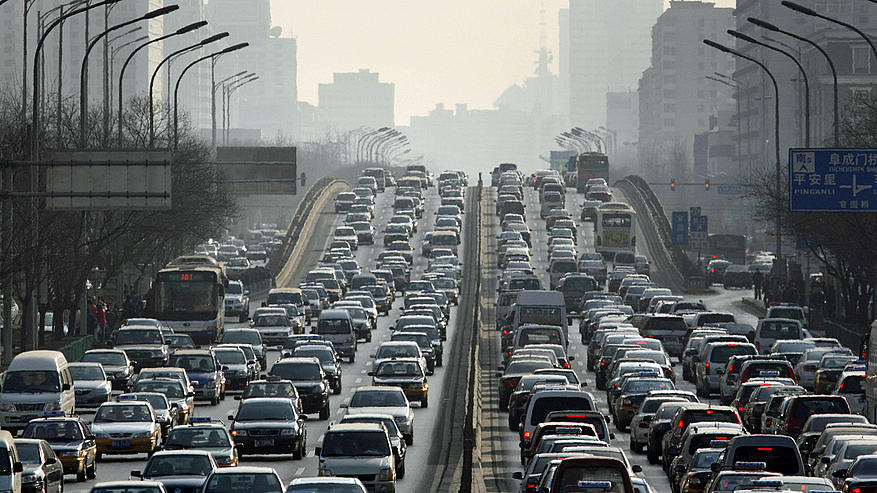 Exhaust emissions from automobiles are close to the worst polluters. In fact just about all of the provinces and the federal government have been looking at emissions trading systems similar, in some way to what Ontario is implementing as part of a climate change strategy. Alberta had implemented a more limited trading program well before the NDP swept into power last year, and they no doubt will be looking to Ontario’s experience as they enhance their efforts. Indeed Ontario and Alberta have just announced a new clean technology initiative for climate change, a corollary to this discussion.
Alberta, home to Canada’s fossil fuel industry is also home to those other fossils, the dinosaurs. One dominant theory is that these marvellous creatures were the victims of another period of climate change some 65 million years ago. But unlike our modern-day dinosaurs, who should understand that the climate change affecting us today is of our own doing, those dino’s likely couldn’t and didn’t do anything about it. We do know how to start fixing this – it’s right there Rex – in that Leap Manifesto.

Ray Rivers is an economist and author who writes weekly on federal and provincial issues, applying his 25 years of involvement with federal and provincial ministries. Rivers’ involvement in city matters led to his appointment as founding chair of Burlington’s Sustainable Development Committee. He was also a candidate in the 1995 provincial election
Background links:
Rex on Leap – Rex Murphy on Ontario – Ontario’s CC Strategy – LEAP –
Cap and Trade – Fort McMurray and Climate – Wente – Simpson on Cap and Trade –
Western Climate Initiative – Alberta and Ontario – Dinosaurs –

 By Ray Rivers By Ray Rivers
May 20th, 2106
BURLINGTON, ON
It’s not quite Ukraine or South Africa, but certainly more exciting that the US Congress.
Canada’s parliament turned a page as it broke into uncharacteristic chaos this past week. Unbelievably, we got to see our new prime minister body-check one member with his elbow in the course of undertaking an involuntary rescue of another from what appears to have been a deliberate defensive wall of MPs. The CBC may be considering running the parliamentary channel on Saturday nights, just so we don’t miss the best fights on TV.
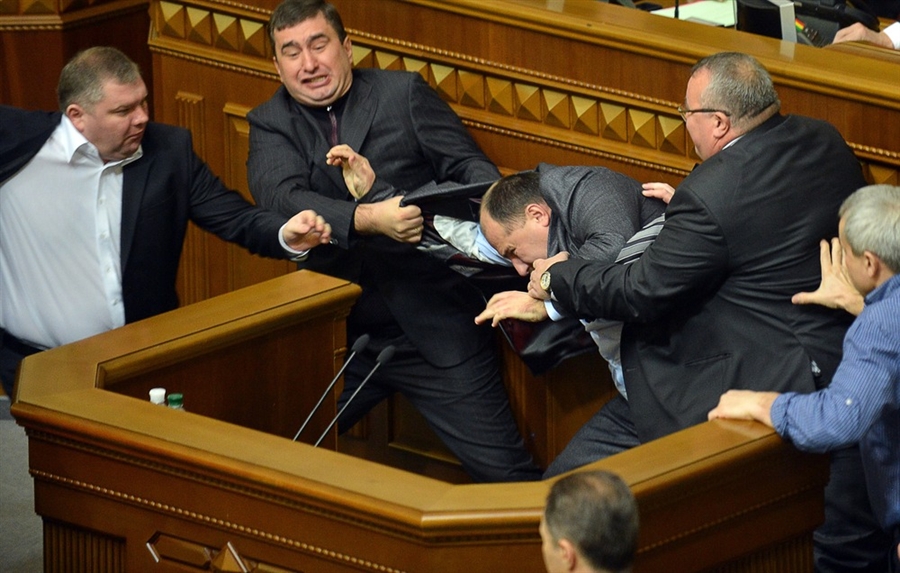 Members of the Ukraine parliament are a little more obvious wen it comes to manhandling each other. It was fitting that Canada’s near-invisible former PM, Mr. Harper, had chosen to grace the lower chamber with his presence, perhaps tipped-off to the likelihood of a skirmish among MPs ensuing. After all Harper is an avid hockey fan, having written a book on the topic. And we all know the best part of the good old hockey game is when a fight break out.
Walking into a crowded floor of opposition MP’s is nothing short of an invitation for trouble, something Mr. Trudeau should have realized, despite an apparent over-confidence in his own ability to get things done. Though there is no doubt that our PM can handle himself in a scuffle.
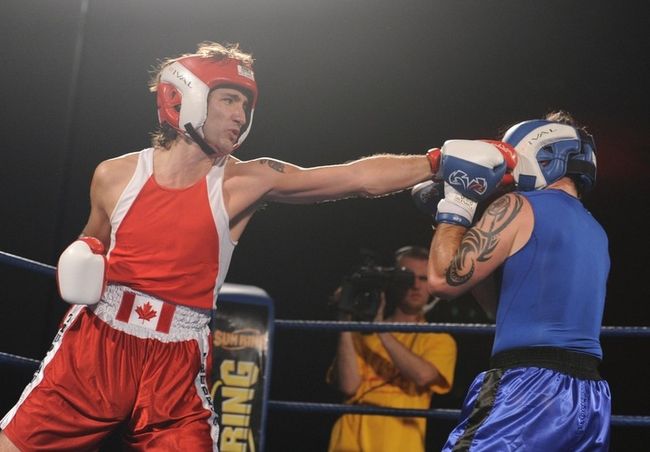 Prior to becoming Prime Minister Justin Trudeau dukes it out with then Senator Patrick – that left jab worked for him. Recall that boxing charity match, a few years ago, with Senator Patrick Brazeau. Martial arts pro Brazeau was the 3:1 favourite but ended up being beaten into oblivion by the son of, arguably, Canada’s most famous PM – a martial artist in his own right. This Trudeau guy is not the kind to hide in the closet were there another gun fight on Parliament Hill.
However, it appears Canada’s most positive and sensitive PM in a long time can talk softly and carry a big elbow. And Trudeau’s well-earned reputation as a fighter did him no favour, as the NDP member, who suffered the blow to her chest, used the opportunity to drag the PM down.
And honestly it was as if I’d seen a ghost. For a moment it seemed that Rob Ford was back, this time bullying his way through the corridors of the House of Commons instead of City Hall. He had been Canada’s most colourful mayor, though mostly for his notorious antics. And it’s no secret that he and his brother both had long aspired to get to that top job which Mr. Trudeau now holds.
Watching the sad episode I couldn’t help thinking about how Sunny Ways had descended into some kind of Ford-like Trudeau Nation. At least on that day, as an obviously exasperated PM appeared to be trying to assist the Tory parliamentary whip to his seat in order to complete the vote on assisted suicide. If Mr. Trudeau’s intentions had been good he had just stepped on that proverbial paved road to hell – at least until he apologized.
And Canada owns the apology, unlike the Americans and Brits who would rather die first than say they had ever made a mistake and were sorry for it. Apology is our national expression.
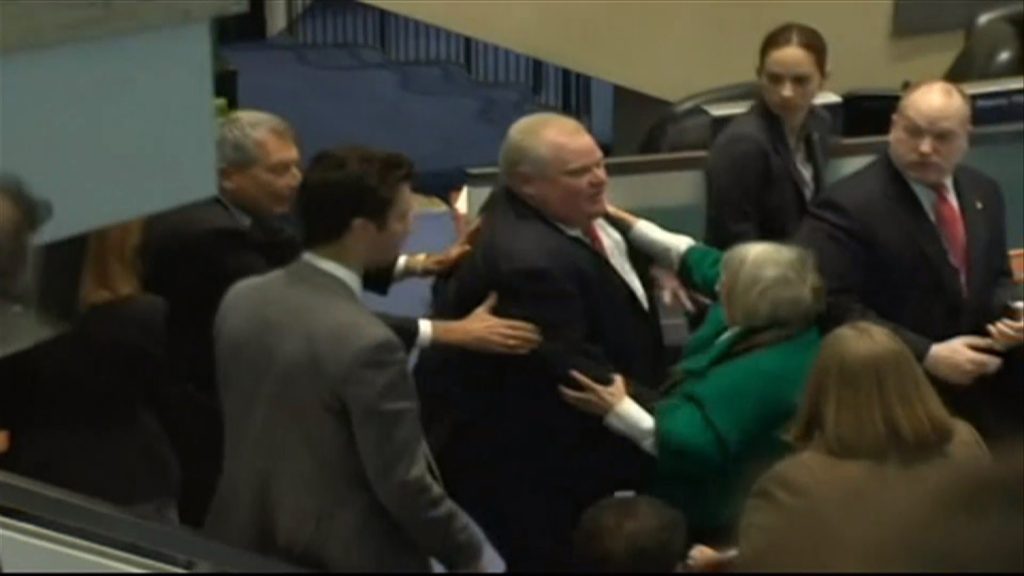 The late Rob Ford, a former Mayor of Toronto, rushing around city council chamber knocks over a fellow member of council. And its not a partisan thing, Mr. Harper had done his share of apologizing, and Trudeau himself had just finished apologizing to, presumably, the descendants of a group of refugees from India which we turned back over a century ago.
Trudeau has now apologized, not once or twice, but three times for his almost inexplicable behaviour. Nobody should think his intentions were malicious, but they were clearly inappropriate. Parliament was constructed to be a theatre of confrontation. It is the role of opposition parties to damage the governing party and their agenda however they choose. In this case the PM set himself up for an ambush and he got what was coming.
Mr. Trudeau has distinguished himself with his innovative and refreshing approach to all things, from the Syrian refugees to Canada’s own aboriginal people. For that he has earned the respect of people at home and everywhere. But this Commons scuffle has taught him an important lesson about limits. There is a time and place for everything and Parliament is the place to persevere with protocol.
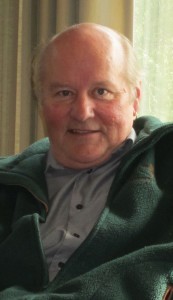
Ray Rivers writes weekly on both federal and provincial politics, applying his more than 25 years as a federal bureaucrat to his thinking. Rivers was a candidate for provincial office in Burlington in 1995. He was the founder of the Burlington citizen committee on sustainability at a time when climate warming was a hotly debated subject.
Background links:
Rob Ford – House Scuffle – South Africa – Ukraine – Brazeau Fight –
Trudeau on Daily Show – Apology – Apology more –

 By Ray Rivers By Ray Rivers
May 13, 2016
BURLINGTON, ON
Even deep ecologists, the folks who’ll tell you that fire is a natural part of a sustainable forest, cannot defend what has been happening at Fort McMurray, Alberta. The ‘Beast’, Fort McMurray’s runaway fire is not a controlled burn by any measure. This has been called the worst environmental disaster in Canadian history.
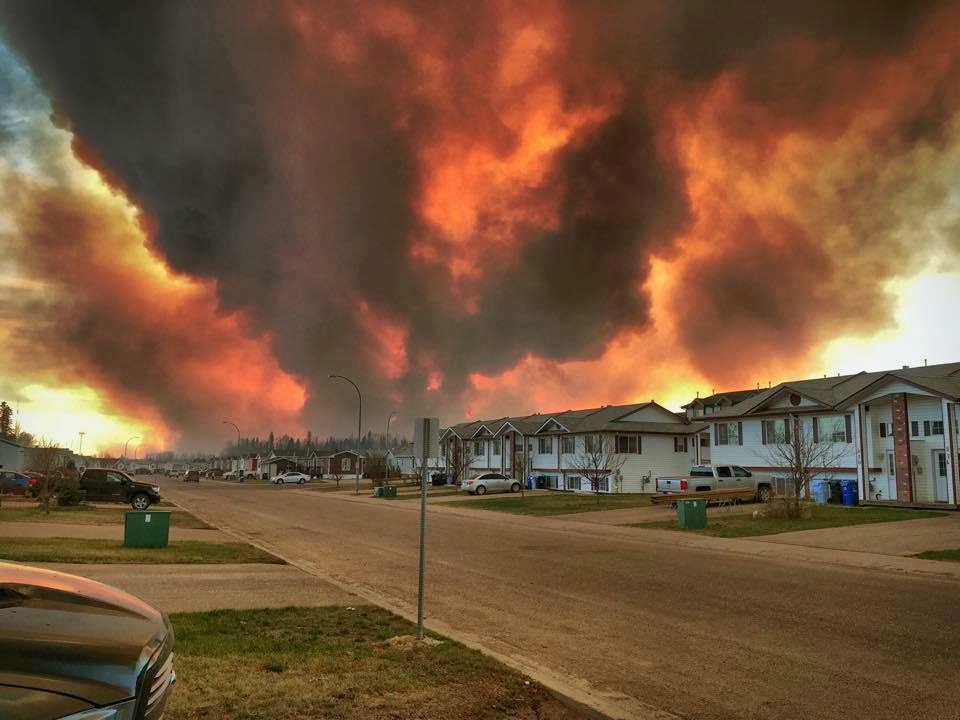 The fire, named the Beast bu he men and women who had to fight it day after day, moved into communities an wiped out everything in its path. The Beast has gobbled up over 200,000 hectares of woodland so far. That is more acreage than foresters harvest in B.C.annually. And it is twice as much as gets taken down each year in Ontario, generating 13 billion dollars in revenues, including some five billion dollars in forest products exports for our province. Also, Ontario’s treasury gets $100 million in royalty payments, and of course there are all those spin off benefits.
Firefighters managed to save an estimated eighty to ninety percent of the building stock in the Fort McMurray, though some suburbs were virtually destroyed. And the entire city and surrounding communities, as many as 100,000 residents, had to be evacuated. In a show of national unity all Canadians and many of their provincial governments came forward contributing fire-fighters and money to help with the consequences and aftermath of this event.
Canada is no stranger to forest fires. As a country which has the world’s second largest land mass, much of it sparsely populated, we typically lose over 600,000 hectares to fire every year. But the fire season has barely started this year and the Beast has already claimed a third of that with the fire still burning. The exceptionally hot and dry spring, and possibly a careless human, are the likely causes. But authorities worry that Edmonton, also experiencing exceptionally dry conditions, may be next.
Is climate change to blame? This is exactly the kind of event that climatologists have been predicting. And that would make this the second time in only a couple years, that Alberta has been hit with a major climate related event – recall that monster flood in Calgary a couple years ago. But few people are saying that in public. Well, Elizabeth May, the Green Party leader, is but then she’ll never be PM so she can say what is truly on her mind. Our new climate-change-fighting PM was reluctant to make the linkage, though he doesn’t really need to – it’s obvious.
Of course nobody wants to be accused of blaming the victims, including the oil sands operators who have had to suspend operations. Our hearts go out for the people who’ve lost their homes and possession, and have spent the last several days living in community centres, or with family somewhere else. And the truth is that leaping to shut down oil sands operations, in recognition of the reality before us, would hardly reverse the climate change we are experiencing in the short run anyway.
 The Leap Manifesto should at last be read – Rivers has created a link to the document at the bottom of his column. You may have heard about the Leap Manifesto, something which nearly tore the heart out of the recent NDP national convention in Edmonton. Avi Lewis, son of former Ontario NDP leader Stephen Lewis presented it in the faint hope of obtaining an endorsement by that party. Its non-partisan sticker notwithstanding, the document was produced to influence last year’s federal election and presumably energy policy in Alberta, though even Mr. Mulcair seemed to have mis-interpreted it and Alberta’s Premier was deadly opposed.
Lewis and his wife; journalist, author and social activist Naomi Klein, initiated this project as an afterthought to her book “This Changes Everything” and his documentary of the same name. A number of aboriginal leaders, other social and environmental activists, and wannabes assembled to write the Manifesto which reads, as one would expect, like something written by a committee.
Still Leap has morphed into something of a movement with over 40,000 signatures of support in its call to leap beyond business as usual this leap year, including the call for a guaranteed annual income for all Canadians. And as one of its primary targets, it has raised the hackles of the oil industry by its not so veiled call for shutting down the oil sands and any more pipeline construction.
Fort McMurray, Alberta’s oldest European settlement dating back to 1788, started out as a lonely fur trading establishment. Today it is known as the city that services Canada’s oil sands industry and Canada’s most valued export industry, despite the collapse of oil prices last year. The city will rebuild and recover, the forests surrounding it will regrow and things will go back to normal, for a while anyway.
But the message of the Leap Manifesto is right about how and where we ultimately need to get our energy. Forty years ago we didn’t speak of climate change or global warming. Fossil fuels seemed like the future, energy independence seemed critical and Canada was running out of oil.
 Alberta with the help of the federal government, then led by Mr. Trudeau’s father, supported the oil sands mega-project. But given what we know today, It may well take another Trudeau to help Albertans move away from producing the dirtiest oil on the planet. Alberta with the help of the federal government, then led by Mr. Trudeau’s father, supported the oil sands mega-project. But given what we know today, It may well take another Trudeau to help Albertans move away from producing the dirtiest oil on the planet.

Ray Rivers writes weekly on both federal and provincial politics, applying his more than 25 years as a federal bureaucrat to his thinking. Rivers was a candidate for provincial office in Burlington where he ran as a Liberal against Cam Jackson in 1995, the year Mike Harris and the Common Sense Revolution swept the province. Rivers is no longer active with any political party.
Background links:
The Beast – Fire Damage – Climate Change – Oil Exports – Forest Facts –
Canada’s Forests – Carbon in Forests – Still Burning – Leap – This Changes Everything –
Mulcair on Leap –

 By Pepper Parr By Pepper Parr
May 12, 2016
BURLINGTON, ON
Staffers at city hall are there to carry on the business of government – they are there to do the things that council has decided are best for the city.
That Council, which you elected, hired a city manager who directs the bureaucracy – who – and this is something they tend to forget – are there to send the money that you the tax payer give them.
They are there to do your will – and that of course is where it gets a little tricky.
Whose will? There are many “wills”. There are those who want bicycle lanes everywhere; there are those who want to see less money spent on buses because they feel no on uses the things.
There are those who want calming bumps on street and there are those who want the speed limits lifted.
This is where the politicians have to sense what the public wants and then actually lead rather than react to three people who show up at council meetings to complain.
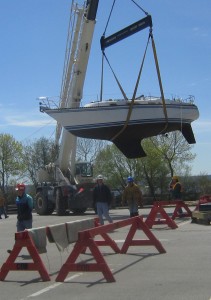 LaSalle Park Marina – boats getting put back into the water.  Water that is shared by the Trumpeter swans. One of the more interesting conflicts is what the environmentalists and the boating people are going through at LaSalle Park. The environmentalists want to ensure that the trumpeter swans have a safe place to live – the boating people wants a safe place for their craft.
Both have legitimate arguments – and both have rights – finding a balance that will work for both is proving difficult for this council – it remains to be seen how this one gets worked out.
Spencer Smith Park is one of the city’s gems. It is used by thousands and taken care of by staff who have a real challenge on their hands.
The park is going to be extended west towards the canal that separates us from Hamilton. There was a lot of controversy over the decision to create a park that was a huge upgrade from what is in place now.
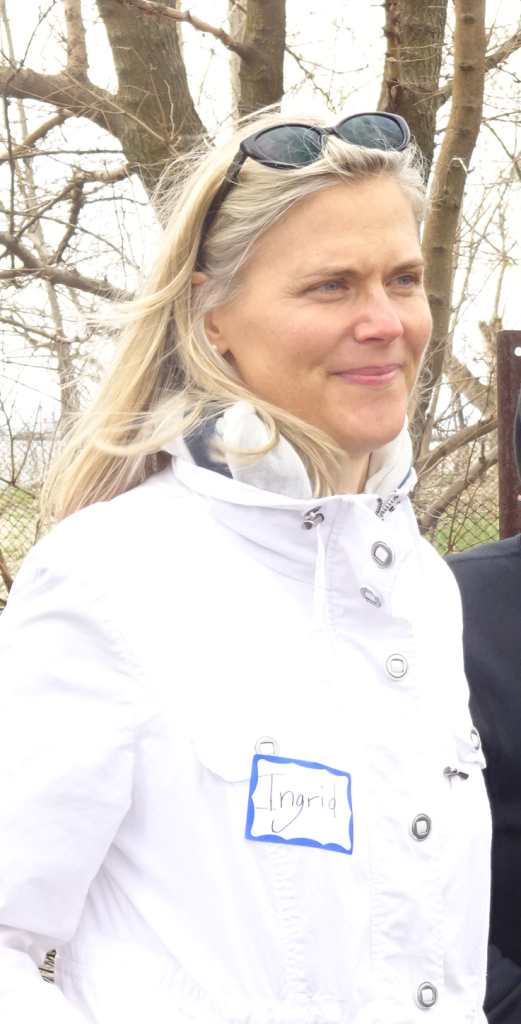 Ingrid Vanderbrug – a city landscape planner During a Jane’s Walk put on by the Sustainable Development Committee last weekend we learned a lot more than city hall was telling people.
The Gazebo which is a significant part of the park – might be seeing the end of its life – the city has plans for something that is accessible and will allow for significantly different uses – there wasn’t any public discussion that we were aware of.
With the technology available today it is so easy to get opinions – the city spent hundreds of thousands on the software that allows them to get a response on any question in a matter of days – add that to the soundings the members of council have and it doesn’t take long to get a sense of what people want – and it is their city – it is their park.
 The plan is to grow some vegetation behind the benches which we hope planners will have some wood on top of the concrete – creating a comfortable place to rest. During that same walk we learned that the patch of land in Spencer Smith Park where the original Brant Inn used to be located is going to get an upgrade which will be one of the first steps in the creating of the several parks that will appear in the Beachway
The landscaping people in the planning department have realized that there aren’t many places in that stretch of the park to sit in shade.
A set of benches are going to be put in with a trellis to shade the area and plants that will stop the geese from coming into the park from the water.
 A very attractive monument marking a point in the Terry Fox Marathon of Hope run 35 years ago will be unveiled in Spencer Smith Park this weekend. The benches will give a very clear line of sight to the Terry Fox marker/monument that will be unveiled this weekend.
Preparing the existing Beachway community for the major changes coming to that part of town are slowly coming about.
The sand dunes in the Beachway are significant and sensitive parts of the ecology of the Beachway. Seedlings are being planed and invasive plans being pulled out – all under the guidance of the Regional planners who are designing and will implement the plans. The city will operate the park once it is completed.
Earlier this week the city began the task of raising Lakeshore Road where it curves around the Joseph Brant Museum and leads to the new entrance to the hospital expansion that is under construction.
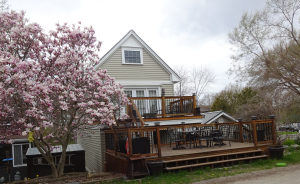 This home is in a location that just doesn’t fit with the plans that have been created for a much different Beachway community. Do plans ever get changed – and if they were changed how would this home be integrated into the existing plans? Don’t expect the couple that live in this home to go quietly into the night with a big cheque in their pockets. Would you?  The owner of this home is putting on insulation – perhaps with a federal or provincial grant, which would be ironic. This owner doesn’t look like a willing seller. All this takes place while the delicate back and forth of property purchases takes place. The Region has what they refer to as a willing seller/willing buyer policy that has them buying the 25+ homes in the Beachway from any seller who wants to part ways with what they own.
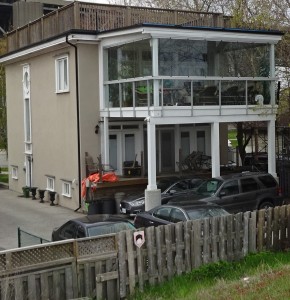 Why would a home like this be torn down? For a park? The implication here is that every property owner will eventually sell. Wait for the really nasty fights when the last three or four hold outs meet wit the power of local government.

 By Staff By Staff
May 11th, 2016
BURLINGTON, ON
Our colleagues at CATCH (Citizens at City Hall) published a piece on a meeting where the provincial Minister of the Environment and Climate Change spoke of the impact climate change is having on us – Now. Burlington understands what he is talking about – he drives the point even further than the August 2014 flood did,
Ontario’s minister of the environment and climate change had some blunt advice when he spoke at the climate resilient cities conference in Hamilton recently. Glenn Murray offered detailed evidence that climate change already threatens our food and water security and it’s going to get much worse.
While he declared that “there’s nothing that Hamilton lacks to be the kick-ass city in Canada”, the former mayor of Winnipeg made clear that “fundamental transformation” in our urban form is required including intensification and no more suburban sprawl.
“I want to take you to the context of where I think we as a group of leaders have to understand and what the dynamics are,” he began. “And I will just offer the proposition that the two biggest crises that we face on the adaptation and resilience side are food security and water security.”
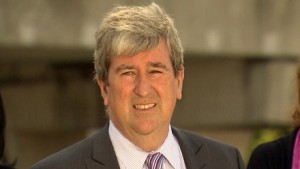 Glen Murray – Minister of the Environment and Climate Change He pointed to a Toronto storm three years ago that dumped a month’s rain in one hour and tore out 80 metres of GO train track “that cost us $600 million which could basically pay for half of [Hamilton’s] LRT.” And he cited “false springs” that wiped out the local apple crop in 2012. He also explained the link of many extreme weather events to the melting arctic ice cap and its effect on the polar vortex.
“The jet stream has slowed down by about 20 percent which means that the periods which are wet last longer, the periods which are dry last longer and that causes us to have so many droughts as we saw in the prairies, fires, invasions of species – the beetles that are destroying our forests,” Minister Murray explained. “And then we have moisture levels on the prairies that we haven’t seen since the last ice age – and if we didn’t have the modern irrigation we have now we probably would be courting if not in the dust bowl, and for the first time Calgary and Regina had air quality warnings because of the level of smoke from fires on the prairies.”
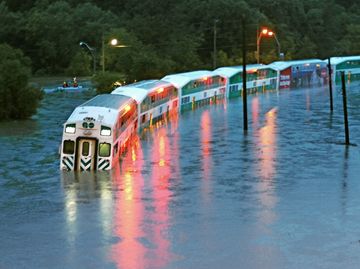 The cost of repairing GO train tracks when Toronto experienced flooding would have paid for half of the LRT coming to Hamilton. He spoke a week before a tinder dry forest and 32C temperatures helped fuel the catastrophic fire in Fort McMurray despite its near sub-arctic location at the same latitude as the northern tip of Ontario and lower Hudson’s Bay.
Murray reminded his audience that last year’s “disruptive spring” experiences included four to five metres of snow “on the streets of Halifax and St John’s” in the last week of April and asked what that would have done in Hamilton. “No one had much of a garden in Atlantic Canada last year. That was also the summer that we had fires on the Prairies the soft fruit crop blossomed in January in BC and died.”
Focusing particularly on food security, the Minister argued that the jet stream destabilization has “had some very bad impacts on our ability to produce food” and warned that “if you want to destabilize a government, all you have to do as a society is just have a food or water shortage for any period of time.”
As an example, he pointed to the extreme drought in the Middle East in 2006-2011 where there was “an 80 percent food crop loss in northern Syria and the fertile crescent about 1.6 million people lost their farms and became the underclass in Damascas, which was according to the Pentagon a swift threat multiplier in the destabilization of the region and the on-going war and then the insertion of terrorism.” Murray noted that “ISIS is hanging onto the three largest irrigation dams … so they’re obviously sophisticated in assessing the power of control of water.”
 Fields of California broccoli – 95% of ours comes from here. Bringing this closer to home, the Minister detailed the development of the California drought where “80 percent of water use is for agriculture” and the National Oceanic and Atmospheric Administration (NOAA) has found the description of extreme drought no longer adequate and has introduced “exceptional drought” into its terminology.
“You see the blood red stain in the middle of California ,” he said pointing to one of his slides. “That’s a piece of real estate that’s very important to your life and to my life because we import $4 billion worth of food as a northern community.”
California, he explained, provides “95 percent of all US broccoli, 92 percent of strawberries, 91% of grapes, 90 percent of tomatoes, 84 percent of all lettuce” and similar percentages to Ontario. While noting that almost all of this is grown in that blood red stained area, Murray warned he “could keep going with all the other things your mother told you to eat lots of when you were growing up.”
A particular “perversity” in the California situation is that nut and pistachio growers are “have now bought surplus drilling equipment from Alberta” and are “going down 2000 feet into the aquifers of California leading to collapse, whereas the vegetable farmers can only afford equipment that goes down about 200 feet.”
 Burlington resident weren’t comfortable with a five storey project in the downtown core – developer cut it back to four. This is an absurdity,” Murray declared. Murray also explained that the climate change we’re already seeing is certain to get significantly worse because carbon dioxide stays in the atmosphere for 40 to 250 years.
“So looking back right now we are experiencing the full force of carbon dioxide levels from 1916, in the middle of the First World War, and we’re just now experiencing the initial impacts of carbon dioxide from 1976 when I graduated from high school.”
He underlined that “sobering” thought by noting that “the rapid explosion of the suburbs in the fifties – the great low density carbon intensive neighbourhoods – all the weight of all of that activity and change in urban form has not yet impacted.”
 Burlington Hydro loaned electric BMW’s to city council members top record their driving habits – when will the wave of buying electric cars hit us? Murray connected this to the province’s commitment to rapid transit by inviting the audience to look at the Yonge subway line in Toronto from the vantage point of the top of the CN tower. “You can clearly see where it is because at every subway stop there are spikes of large commercial and residential buildings all the way up to York,” he said.
He compared that to the Bloor line where city councillors and their residents fight intensification. “There’s a fight over a four-storey building in Etobicoke – they’re fighting it because it’s ‘too intense’. This is the absurdity,” Murray declared.
He didn’t suggest this might happen along Hamilton’s LRT line, but the link was obvious, and he underlined it by the results of a mapping study of taxes versus density that confirmed “all the neighbourhoods who use a lot of infrastructure for a very small tax base are well dispersed suburbs, big box formula subdivisions, and Hamilton.”
He ended with advice to individual Hamiltonians: “Drive less, get an electric vehicle, congratulations on getting a rapid transit line in Hamilton and please use it. Or walk, it’s a beautiful city to walk in.”

 By Ray Rivers By Ray Rivers
May 6, 2016
BURLINGTON, ON
Does anyone remember why the Harper government decided to cancel the long form census in 2011 and replace it with a voluntary survey? It wasn’t to save money because, when adjusted for inflation, the 2011 census exercise cost more than its predecessor, the 2006 census. It wasn’t, as they argued at the time, about privacy. There had been no cases or serious complaints about census questions violating our rights to privacy. The Supreme Court had not charged the government to change how and what data it collects.
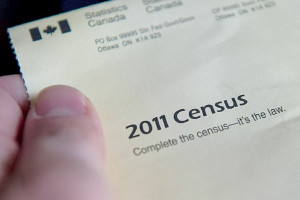 The law requires everyone to fill in the census form sent to them. And it wasn’t to improve the quality or degree of information gathered. That is the information used by governments to influence a wide range of policy and program decisions, as well as the many private companies and organizations who had complained of the changes at the time. And those complaints were warranted, given the general conclusion that the 2011 census was largely a wasted exercise.
Doesn’t conservative have something to do with retaining tradition, and what could be more traditional and time honoured than establishing accurate census information. The first stock-taking in our nation’s history, in fact in North America, goes back to the one undertaken by the New France Intendant, Jean Talon, in 1666. As the Canadian colonies came together to form our nation, section 8 of the British North America Act required a ten-yearly census to be undertaken. So in 1871 the new confederation of four provinces conducted its first national census.
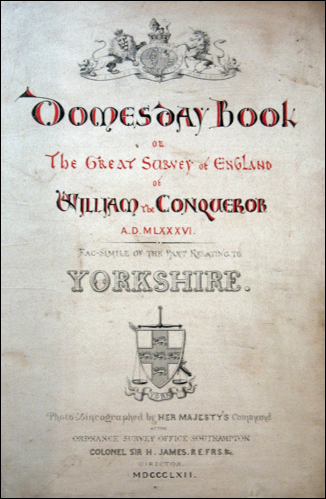 Reproduction of the cover page from what is seen as the first census – the Domsday Book. The 1086 Domsday Book is heralded as the first census, though there are biblical era references to surveys conducted well before that time. Still, William the Conqueror’s effort to establish his rightful tax base and various property holdings across Great Britain holds its place in history and was only replicated some eight centuries later, in 1873, through the so-called Modern Domsday Book. The title itself had little to do with doom or disaster, but rather was a derivation of the old English word “doom” meaning law or judgement.
It may have been ‘Tea Party’ Ideology, a disdain for science and knowledge, or just a bone-headed mistake. One can only speculate as to why the former PM was so determined to fix something which wasn’t broken, in fact had been working well and serving us well.
 Census map with population data So one of the early actions of the new Liberal government was to give Statistics Canada the right to return to traditional data gathering with the 2016 census.
And Canadians have responded overwhelmingly, in fact overloading and crashing the census website with their enthusiasm, and their determination to be counted.
I received both the long and short form, went on line, and had them each completed on-line in a matter of a few minutes. And, as I recorded my confirmation number I couldn’t help asking myself – what was all the fuss about?

Ray Rivers writes weekly on both federal and provincial politics, applying his more than 25 years as a federal bureaucrat to his thinking. Rivers was a candidate for provincial office in Burlington where he ran as a Liberal against Cam Jackson in 1995, the year Mike Harris and the Common Sense Revolution swept the province. Rivers is no longer active with any political party.
Background links:
Wasted Effort Getting Less for More Canada’s Census History Canada’s Census –
The Doomsday Book
Census Web Site Response to Return of Long Form Biblical Census –

What does it mean to be “sustainable” – why does it matter and if it matters that much – why isn’t every one doing it?
This was a question the Gazette put to Jim Feilders, a committed environmentalist and an engineer with a private practice. Here is what Feilders had to say:
 By Jim Feilders By Jim Feilders
May 1, 2016
BURLINGTON, ON
A general definition of sustainability is the ability to continue a defined behavior indefinitely. This can apply to everything from keeping your body alive to the survival of the universe. But most of us think about it in terms of maintaining our lifestyles in the environment in which we live.
The three most common aspects of sustainability are environmental, economic and social. Some like to include culture as a separate item but it generally is included under the social umbrella.
 There was a point when the cod fishery in Newfoundland was a massive industry until the Grand Banks were fished out – it took years to get back the balance that was once in place. For the environment to be sustainable, the planet has to be able to respond to the human use of resources and pollution created. An example of this gone wrong is over-fishing of the Grand Banks off Newfoundland that resulted in depletion of cod. Wildlife species are becoming extinct by direct killing of animals and destruction of habitat. When the balance of nature is upset, significant changes occur.
We want to know that the planet will be around for future generations. If we don’t maintain a balance between what we do to harm the planet and the capacity of the earth to recover from it, we will find ourselves living on a dying planet. Evidence exists that we are on that path and a global initiative is underway to try to do something about it. Sending too much carbon into the air and oceans is causing global climate change with disastrous impacts. Information is available on the major countries of the world in terms of their biocapacity versus their environmental footprint. It’s just a fancy way of describing whether the environment can absorb all the pollution being produced. Not surprisingly, the US and China are in the red while Canada still has room left over after sucking up all we spew out.
 Each of us has an ecological footprint – how big might yours be? Economic sustainability deals with the ability to support a defined level of economic production indefinitely. The most common expression of this is balanced budgets where countries do not spend more than they bring in. As we are all aware, balanced budgets are not common and the devastating effects on the human population are obvious.
Socially, we can be sustainable when the country functions at a defined level of social well being indefinitely. This includes health care, recreational amenities, schools, good transportation, religious buildings and other institutions in a manner that creates a sense of community.
Most of us agree something should be done to keep us sustainable but how we can contribute on an individual basis is perplexing. Governments, particularly local municipal ones, have the greatest role to play through passing legislation to control services, development and pollution. This makes it easier for people to do their part as they are forced into it. Garbage recycling is a good example. Providing a balanced transportation system is another. But government can only push so hard. We live in a free country and have to let our citizens decide on what kind of place in which to live.
Why we don’t do more as individuals has been a topic of discussion for decades. Recently, a Canadian entrepreneur and author, Tom Rand, with degrees in both engineering and philosophy, discusses environmental sustainability in his book “Waking the Frog”. In essence, we are reluctant to change. With our busy lifestyles, we give little thought to what we can do. It is probably not a mass conspiracy of the oil companies. The affluent especially, see no benefit because maintaining their lifestyle is usually just a matter of spending more money when pollution penalties arise.
 The earth needs green fields like this – we need them if we are to survive as human beings on this planet. At this point in time we are losing this battle. To make our planet sustainable, we can start right within our own communities. We can become involved by exercising age old philosophies of democratic voting, donating financially to worthy causes and directly helping others. When we work together and support each other, the job goes faster and easier. Many forums exist that offer something for everyone to use their specific talents. When stories are heard about dramatic changes such as housing of homeless people in Medicine Hat, Alberta, we are spurred on to do our bit. Burlington is at the tipping point of real change in terms of a sustainable community with the completion of its strategic Plan.
With climate change being such a pressing issue, there are two simple things that we can do right now. Many of us think saving the planet means sacrifices such as taking the bus, turning down the heat and wearing sweaters or yelling at the kids to turn off the lights in unoccupied rooms. But modern technologies for electric and hybrid vehicles and electric heat pumps for heating and cooling our homes are available now that do not require sacrifices.
Despite the apparent higher cost of electricity compared to natural gas and gasoline, these more efficient solutions are actually cheaper on a monthly basis to own and operate.
So get involved where your talents are best put to use and encourage others to do the same. To coin the phrase of BurlingtonGreen: “Together we can make a difference.”

 By Ray Rivers By Ray Rivers
April 29, 2016
BURLINGTON, ON
I recall a doctor once complaining to me that his father, also a doctor, used to make ten times the average worker’s salary while he only made five. We all know that doctors generally make good money, which is why we were instructed by our parents to become doctors and why we’ve told our children to do the same.
The medical association will point out that American doctors are even better rewarded in that wasteful multiple-payer system south of the border. Of course some sports athletes, pop musicians, film actors and even senior bankers now make more. Except we don’t pay any of those people out of a public purse. And public financing is the issue behind the Ontario Government’s efforts to trim back potentially out-of-date medical billings.
Most of Ontario’s doctors work on a piece-work basis, charging OHIP for every patient who goes through their turnstile. And how they get remunerated depends on a highly complicated fee schedule, which gets negotiated between the doctors’ union, their medical association and your government, the health insurer. So how did one eye doctor bill $6.6 million in one year, when the average billing is more like three or four hundred thousand dollars?
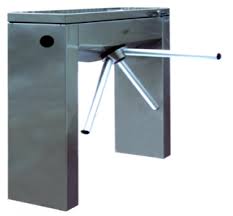 In the absence of more detailed information one can only speculate – but it might be that the procedures that doctor used can now be performed more rapidly and efficiently than when the billing rate was set. That would allow more patients through the turnstile and into the cash register. And in that case the Minister has a valid point that the rates need to be revised downwards to better reflect the real cost of that medical service. In the absence of more detailed information one can only speculate – but it might be that the procedures that doctor used can now be performed more rapidly and efficiently than when the billing rate was set. That would allow more patients through the turnstile and into the cash register. And in that case the Minister has a valid point that the rates need to be revised downwards to better reflect the real cost of that medical service.
In the absence of a competitive market for medical services, value is determined by how long it takes, what kind of hardware is needed and how much skill is required. But even in the US, with a more competitive insurance model, services are priced in a similar fashion. So that is what Ontario’s Minister of Health, Eric Hoskins, who is a doctor himself, is trying to do – ensure that we get value for our medical buck by updating the fee schedule.
Of course that doesn’t resolve the issue of how much doctors should be making. My accountant keeps telling me to look at the net, after tax income, not the gross. So if society feels anyone, be they doctors, bankers or sports celebrities, are bring home too much dough, there is a solution. Just tax it back as we used to do in the 50’s and 60’s. And doing that within reasonable limits will also reduce the growing gap between the rich and poor, which everyone claims to deplore.
Trickle-down economics, as ridiculous a term as that sounds, was the rationale that allowed conservative-minded governments to redistribute income from the poor to the rich. Ronald Reagan was the perfect anti-Robin Hood. Canada’s income gap got a new life following the tax reforms brought in by former PM Brian Mulroney and his Bill C-139, which he ironically termed tax simplification.
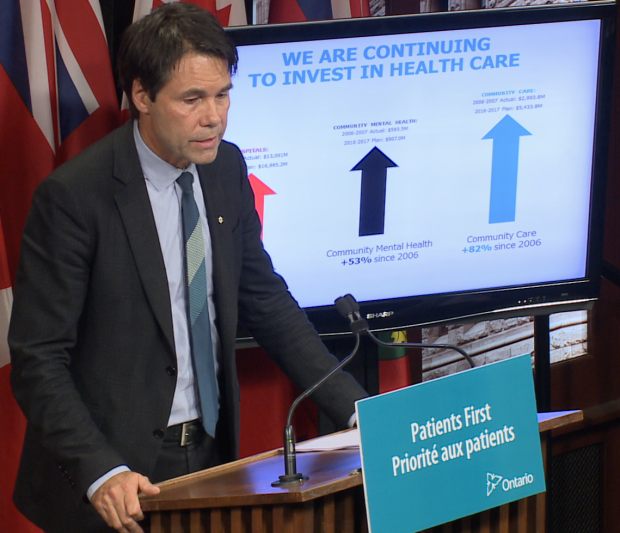 Ontario’s Minister of Health Erik Hoskins, also a doctor, puts the province’s argument forward – the doctor’s lobby has always been effective. Mulroney virtually dismantled our progressive taxation system, reducing rate classes to only three from the previous ten. He raised the tax rate for the lowest class from 6 to 17 percent and lowered the highest to 29 percent from 34. This placed more of the tax burden on the middle and lower classes. This huge shift in the tax burden also underlay the poor economic performance that plagued his government and the enormous structural deficit that Mulroney created and ran in every single year of his administration.
Our new PM’s first budget has attempted to address that inequality by lowering taxes for middle and lower incomes, and shifting more of the burden back to the wealthy through a new higher tax bracket. And that has brought out the trickle-down crowd once again. Stomping their feet as they hit the pavement in places like the National Post, warning of imminent doom unless the rich, once again, get more money. It’s as if ignorance, greed and stupidity have no bounds.

Ray Rivers writes weekly on both federal and provincial politics, applying his more than 25 years as a federal bureaucrat to his thinking. Rivers was a candidate for provincial office in Burlington where he ran as a Liberal against Cam Jackson in 1995, the year Mike Harris and the Common Sense Revolution swept the province. Rivers is no longer active with any political party. You can tweet him at @rayzrivers
Background links:
Health Minister’s Announcement – Doctor’s Salaries – Pay Cuts – Physician Remuneration – CD Howe Perspective –
US Doctor Income – $6.6 Million Doctor – Historical Taxation Policies – Harper’s Taxes – Trudeau’s Taxes –
How Much is Too Much – The Trickle-Down Crowd –

 By Ray Rivers By Ray Rivers
April 22, 2016
BURLINGTON,ON
Ray Rivers has been writing an opinion column for the Gazette for more than three years. He is currently on a personal research assignment in the Ukraine doing background for his next novel. While out of the country Rivers has kept abreast of current events and could not miss the opportunity to comment on the trial of Mike Duffy.
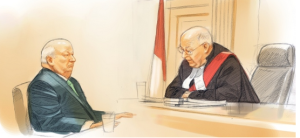 Duffy, left, listens as Justice Charles Vaillancourt reads from his ruling in an Ottawa courtroom on Thursday. Illustration by Greg Banning. Of course the judge is right about Harper and his henchmen (aka PMO). It’s what we expected from a Prime Minister who distinguished himself by displaying irreverence for the political institutions and the processes he had been elected to protect. In fact as the Duffy case has shown it is more than disrespect – it’s abuse of power and presumption of privilege. He used the Senate as a chess board and the senators as pawns, to paraphrase Justice Charles Vaillancourt.
 What was really a summer cottage, this Prince Edward Island house was declared to be Senator Duffy’s prime residence. Mike Duffy was never qualified to be the Senator from PEI. He knew that and more importantly so did Mr. Harper who appointed him. They should have understood the inappropriateness of claiming residential expenses, despite Senate bureaucrats telling Duffy it would be OK. It was Duffy who had to sign his name at the bottom of all those claims.
And even if the Senate is a political animal, headlining partisan fund-raising events at public expense is also inappropriate. Again Duffy must have known that, and so would the big guy who ordered him to attend. Parliamentarians are not allowed to use public money for partisan purposes. Have we forgotten the Sponsorship scandal so soon?
And this cheque he was given to pay back the money he’d falsely claimed. It may not have been a bribe, but it was intended to keep Duffy quiet and sweep this messy business out of public view, again paraphrasing the judge. And who is going to argue with the PM’s right-hand person? And especially when the cheque he is offering will keep you out of the poor house at the time?
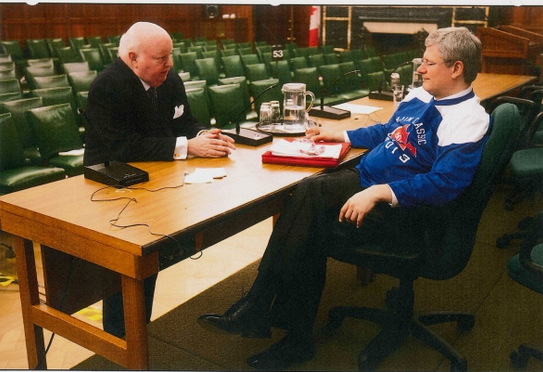 Former Prim Minister Stephen Harper in conversation with Mike Duffy This whole messy affair also says a lot about the Justice department and their shoddy performance. It almost appears that they too were under Mr. Harper’s thumb. And did this process really cost $30 million dollars? Minimal cross examination, never asked Duffy about the famous cheque, and never called the PM to the stand. As the judge’s decision implies, the crown had the wrong fellow in the dock. This time the mounties really didn’t get their man.
This whole affair is a sad comment on Canadian politics. We should all be embarrassed by what we’ve allowed to happen. But then the judge let Duffy get away without so much as a slap on the wrist. Maybe not guilty, but he was hardly innocent. It’s no wonder that the Globe and Mail barely mentioned this story in their on-line version last night. And yet a year ago it was hot in the news.
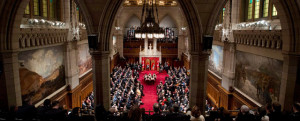 The Senate. The Canadian Senate is an historical mistake that just keeps on giving. One can only hope that Mr. Trudeau’s efforts to transform the Senate into a non-partisan camp works. At least no Senator need be fund-raising for a political party, if he/she is truly non-partisan. And hopefully a non-partisan appointment advisory committee will do a better job at finding people to represent PEI, among people who actually live in PEI.
Mr. Duffy was a victim of his own ambition and a Prime Minister who used him for his own purposes. I’d like to think of the chamber of ‘sober second thought; as filled with intelligent and ethical Canadians whose first priority is to serve the public. I’d have a hard time saying that about Mike Duffy. I just hope his Senate days are over.

Ray Rivers writes weekly on both federal and provincial politics, applying his more than 25 years as a federal bureaucrat to his thinking. Rivers was a candidate for provincial office in Burlington where he ran as a Liberal against Cam Jackson in 1995, the year Mike Harris and the Common Sense Revolution swept the province. Ray has published one book and is working on a second.
Background links:
Trial Decision Blog – Trial Decision – Mike Duffy – Vindication of the Man

 By Ray Rivers By Ray Rivers
April 20, 2016
BURLINGTON, ON
Canada has been a strong supporter of Ukraine. After all – there are more diaspora here than anywhere else, except Russia. So we’ve offered economic help, spoken out at the UN and NATO, are helping to train Ukrainian troops, and even supplying some military equipment. In a rare moment of domestic political agreement, both the former Conservatives and Mr. Trudeau’s party have been unanimous in this support
I visited the ‘National Museum of the History of Ukraine’ in World War II, which used to be called the ‘Museum of the Great Patriotic War’ before Mr. Putin’s invasions. These are not the times to be ambiguous about whose patriotism we are talking about – so the name got changed. It’s an impressive museum and there are magnificent sculptures on the grounds – of the proletariat, men and women, doing their bit for the big victory.
Many Ukrainians died in the Second World War and one could ask what they actually were fighting for. The Nazis were nasty people. Yet, looking at Finland fighting Russian aggression, some nationalist Ukrainians had hoped that the Germans would free them from the yoke of the oppressive Soviet regime, and its murderous leader. I didn’t notice much of that discussion among the gunnery and soldiers uniforms spread about the floors of the museum. Not yet anyway.
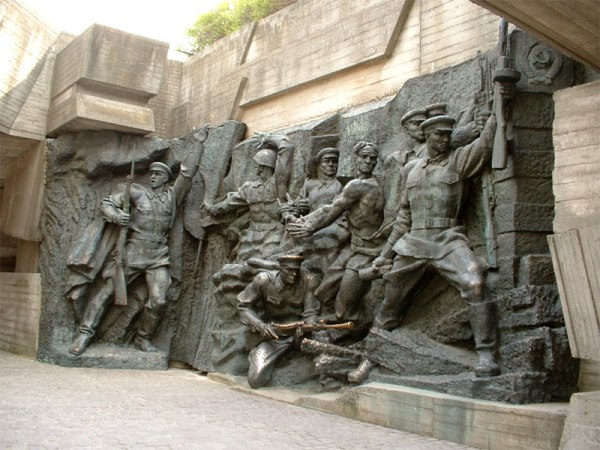 On the main floor, near the exit, sits a military truck, riddled with bullet holes, as if it were placed there to tease the attendee. Sure enough around the corner is a room dedicated to the over 2000 soldiers who had recently been killed in the Donbas. And that wasn’t counting the civilians or the number who’d been sacrificed on the other side, including those of the Russian regular army. A war without purpose and seemingly without end. On the main floor, near the exit, sits a military truck, riddled with bullet holes, as if it were placed there to tease the attendee. Sure enough around the corner is a room dedicated to the over 2000 soldiers who had recently been killed in the Donbas. And that wasn’t counting the civilians or the number who’d been sacrificed on the other side, including those of the Russian regular army. A war without purpose and seemingly without end.
It was a moving exhibit set in the context of what was going on today. As I turned to leave, my eyes locked with those of the presiding female attendant. It was only a few seconds but I was left with a powerful image that will always haunt me. We didn’t speak, and anyway, what would we have said, and in which language – but the emotion was clear?
Mr. Putin would argue that Ukraine isn’t a nation and so Ukrainian isn’t a national language – just a dialect of Russian. Yet this language still persists and is growing in use, despite numerous efforts by the subsequent Russian and Soviet authorities to destroy it. And while more people speak Russian globally, researchers argue that Russian was derived from Ukrainian and not the other way around, making it the dialect in my book.
Being Canadian I know a little of linguistic divides, because we are a bilingual nation, and a relatively contented one at the present. And English and French are a lot more dissimilar than Slavic tongues, so the divide would be greater if we let it be. Canada is a bilingual country but everybody doesn’t speak both languages and we understand that we never will.
Today Russian speakers still make up a large percentage of the Ukrainian population. One elderly lady, I’d met, living in one of Kyiv’s Soviet-styled suburbs, explained to me how she had migrated from Russia in 1954. With one daughter now living in Ukrainian Kyiv and another in the Russian enclave of Kaliningrad she slowly drew an imaginary line across her chest showing me how her heart was torn.
Another woman I met on the train, was returning to Kherson to sell her apartment after having lived in New York for the last 7 years. She complained that she hated the Ukrainian language and marveled that I was venturing to travel in this land given my relatively poor grasp of Ukrainian, though she herself only spoke Russian.
 Does it really matter that Ukrainians speak Russian as well or even primarily instead of Ukrainian. Aren’t they still Ukrainians. Polls indicate that to be the case. The international linguist Michael Moser thinks making Russian an official second language would make social harmony worse rather that better. He would just leave well enough alone. Does it really matter that Ukrainians speak Russian as well or even primarily instead of Ukrainian. Aren’t they still Ukrainians. Polls indicate that to be the case. The international linguist Michael Moser thinks making Russian an official second language would make social harmony worse rather that better. He would just leave well enough alone.
He may be right. Canada chose official bilingualism for very different reasons and that decision has served us well, making francophone Canadians feel at home anywhere they need to deal with the federal government. But Ukraine is a different country, has a longer history, and that makes it more complex. And it has to consider the neighbourhood bully – who holds that if you speak Russian you are a Russian.
But then we don’t have to worry that Canada’s even more powerful neighbour will invade and annex Alberta if we sign a free trade agreement with the EU, or speak with a Texan accent. Though that might improve Mr. Cruz’s claim on legitimacy in his race to become president.

Ray Rivers writes weekly on both federal and provincial politics, applying his more than 25 years as a federal bureaucrat to his thinking. Rivers was a candidate for provincial office in Burlington where he ran as a Liberal against Cam Jackson in 1995, the year Mike Harris and the Common Sense Revolution swept the province. Rivers is no longer active with any political party.
Rivers has been in the Ukraine researching his next book. He returns later this month.
Background links:
War Museum – Finland/Russia – Kaliningrad – Ukraine Crisis –
Ukraine Conflict – Quebec Referendum – Language – More Language – Still More Language –

 By Pepper Parr, Publisher By Pepper Parr, Publisher
April 17, 2016
BURLINGTON, ON
It happens – let a writer out of the country and they get carried away.
The Gazette’s political columnist Ray Rivers asked for some time off to travel to the Ukraine where he wanted to do some research for his next book.
We suggested he try to write his column while he was abroad but didn’t really expect to get anything.
Then the “funny” mushroom column arrived – and we knew that Rivers was at least alive.
 There he is with his picture on the front page and his column inside for everyone to read. What will we read next about this Ukrainian adventure? This morning we find that our ace columnist is on the front page of the Kyiv Post.
Rivers, who know how to promote himself, sent the editor of the Kyiv Post a note saying they could reprint the column if they wished.
nd they wished – so there we are – Burlington’s on-line newspaper finds its political columnist on the front page of a Ukrainian newspaper.
Who owns the paper we wanted to know and how many papers are there in Kyiv?
There are three responded Rivers and I think they are all both paper and on-line: Unian and Ukraine Today are the others. No idea on circulation, nor ownership – an oligarch controls Ukraine Today.
We suggested to Rivers that given the political situation in the Ukraine that he might be “invited” to remain in the country for a while and be given a uniform.
Rivers responded: “There has been no offer of a rifle – but I’d hold out for a tank anyway. And no such luck, you don’t get rid of me that easily.”
“This Kherson ship-building town is really dead and dead poor – more Russian here than Ukrainian – one can tell – the Russkies use Da and Ukes Tak for yes.
We expect Rivers will report again and that he will have a byline of his own in the Ukrainia Kyiv Post.
Do stay tuned.
The funny mushrooms column


By Ray Rivers
April 15, 2016
BURLINGTON, ON
Peace and quiet – not what I expected to find in a city with three million people, the eighth largest in Europe and with a war going on only a few hundred kms away. There are no military tanks on the streets, no machine-gun toting soldiers protecting major institutions and no bombs falling from the sky. If one were looking for that kind of excitement – it’s just not here.
With an economy less than half the size of fellow slavic neighbour Poland, there are a surprising number of modern Euro sedans clogging the streets of Kyiv (Kiev) almost as badly as in the rest of the continent. But the sidewalks are cleaner than Paris and there are no obvious signs of homelessness or drunkenness, though that seems impossible. And again to my surprise, young plugged-in women and men are seen strolling about the streets in the evenings, apparently free from fear for their personal safety.
Shops, restaurants and museums abound, along with ample open spaces and parks to accommodate families and the few tourists who make it over here. The city has a subway system that could give Toronto a few lessons and the architecture is strikingly old world, except in the suburbs where Soviet styled apartment blocks still dominate the skyline. Even the newly reformed police force has been outfitted with Prius patrol cars, giving them a very mod look.
What makes this so impressive is that the country is under siege. Yes, Russia is back in full imperial dress and determined to keep Ukraine as part of its revisionist empire, even if it has to kill all the Ukrainians. Over two years and 10,000 deaths after first invading its neighbour, Russia is nowhere near willing to return the land it occupies. And to keep it’s neighbour on its toes Mr. Putin periodically threatens to occupy the entire nation.
But there is another danger lurking that should not be ignored. Ukraine is the site of the world’s worst nuclear accident, at Chernobyl, just some 100 kms from Kyiv. Opened in 1977 as Ukraine’s first nuclear power plant, and only the third of its kind and size in the Soviet Union, Chernobyl operated for less than a decade before a relatively simple test of safety procedures led to a massive explosion and melt down, spreading radioactive contamination across the globe though mostly predominantly in Belarus, Russia and Ukraine.
 The Chernobyl nuclear station after the explosion – the world is still recovering from that disaster. 2600 square kms of northern Ukraine, half the land area of PEI, is off limits because of radiation poisoning. To keep the lid on the still-emitting source, an expensive new sarcophagus is being constructed. And after 30 years there has been some environmental rebound, with reports of growing wildlife populations and the regrowth of forests in the area. These rumours have encouraged poachers to hunt animals and forage timbers for their own use, despite the inherent danger of radiation poisoning and the further spread of radioactive pollutants.
There is a long term plan to rehabilitate the area but that will not happen for another half decade. Hiroshima and Nagasaki, hit by atomic bombs in the Second World War are pretty much back to normal, though researchers are still not satisfied. Nevertheless for nations operating nuclear power plants this does beg the question of whether those facilities are more dangerous than an attack by a nuclear weapon.
And speaking of radiation, the lowly field mushroom has come under attack as well in Ukraine. Apparently fungi are particularly adept at absorbing radioactive contaminants making them unsafe to consume. Yet, there are few activities more traditional that wild mushroom gathering in this part of the world. Mushroom hunting provides a source of recreation as well as nutrition, something that has become even more important for those struggling to survive in the Russian-occupied eastern Ukraine.
 Mushroom fields – Of course there are those who brush off all of this talk of danger. A few folks who refused to leave the contaminated area are boasting they have reached a good ripe age notwithstanding – something akin to those folks who smoked all their lives but never succumbed to lung cancer. But, not me, my immune system isn’t that good. I’m avoiding the wild mushrooms that feature in just about every menu here.
I attended a choral performance to lament those victims of Chernobyl who passed some thirty years ago. Once again I was impressed with the lack of fuss over security as I carried my backpack into an assembly which included government officials and other dignitaries. Perhaps that is how it is. Perhaps one just gets numbed by what could wrong when so much has and does.
After all, this is a nation which has always known conflict and domination by other nations, including Greeks, Turks, Polish, Swedes, Russians, and Germans…. My Ukrainian grandparents had Austrian birth certificates. So it is understandable why they would not be spooked by Russia, and why they’d be totally blasé about the dangers of eating those tasty wild mushrooms.

 Ray Rivers writes weekly on both federal and provincial politics, applying his more than 25 years as a federal bureaucrat to his thinking. Rivers was a candidate for provincial office in Burlington where he ran as a Liberal against Cam Jackson in 1995, the year Mike Harris and the Common Sense Revolution swept the province. Rivers is no longer active with any political party. Ray Rivers writes weekly on both federal and provincial politics, applying his more than 25 years as a federal bureaucrat to his thinking. Rivers was a candidate for provincial office in Burlington where he ran as a Liberal against Cam Jackson in 1995, the year Mike Harris and the Common Sense Revolution swept the province. Rivers is no longer active with any political party.
Background links:
Poland and Ukraine Chernobyl
Chernobyl Disaster
European Contamination
Radioactive Deer
Mushroom Hunting –
Mushrooms – More Mushrooms
Even More Mushrooms Chernobyl Survivors More Survivors Nuked Cities More Nukes Cities –

 By James Smith By James Smith
April 8, 2016
BURLINGTON, ON
Ted McMeekin, Ontario’s Minister of Municipal Affairs and Housing, has come up with five changes to the Municipal election act:
1 – Shortening the campaign calendar by opening nominations for candidates on May 1 instead of January 1
2 – Creating a framework to regulate third party advertising, including contribution and spending limits
3 – Removing barriers that could affect electors and candidates with disabilities
4 – Making it easier to add or change information on the voters’ list
5 – By far the most significant proposed change is giving municipalities the option of using ranked ballots in future elections, which would allow voters to rank candidates in order of preference. The option to use ranked ballots would begin for the 2018 municipal elections.
To get into the issue let me first cover the motherhood issues.
2- Creating a framework to regulate third party advertising, including contribution and spending limits. Remains to be seen how this will work, but a step in the right direction. Any time we can remove the influence of vested interests from politics, the more reflective and better is our democracy.
3- Making campaigns Barrier Free by requiring city clerks to prepare accessibility plans to identify, remove and prevent barriers that could affect electors and candidates with disabilities, and make the plan available to the public prior to voting day. Welcome change. It will make Ontario’s municipal elections conform more closely to the Province’s AODA (Accessibility for Ontarians with Disabilities Act).
4- Making it easier to add or change information on the voters’ list. I can’t argue with this as I have an issue using the voter data bases. These lists are full on extraneous and wrong information. Anything that can be done to get clean information is long overdue.
All steps in the right direction, as is the big issue of ranked ballots and I’ll have more to say about ranked ballots in a future piece. But the first issue of reducing municipal campaigns should be withdrawn as this is a step backwards.
What? you say, shortening the campaign calendar by four months sounds like a good idea! Who wants a politician around for nine or ten months prior to a municipal election? I get not everyone wants to see a politician for that long. But this hands a hugely significant advantage to incumbent municipal councillors and Mayors. With few ratepayer groups or service clubs organizing town halls or debates, there are few, if any events where voters can go and listen to a debate between candidates or ask them questions.
Most sitting municipal politicians have a significant advantage as an incumbent over any challenger in addition to name recognition for several reasons. Take the present Mayor of Burlington for example, he will have leftover signs, voter identification, volunteer and fundraising lists already sitting in storage waiting for the next election. If a newcomer is looking to challenge the Mayor, that person will have four months less time to build these resources. No small task.
Other elections can and do crowd municipal elections off the stage. Take the 2014 Municipal election for example. The 2014 Provincial Election took up a good portion of the spring. Many municipal candidates essentially put their campaigns on hold while the provincial campaign rolled along. The fixed election date hasn’t been altered so there is a very good likelihood the next provincial election will be held at the same time as the next municipal campaign.
In a move that’s frankly more in keeping with Putin’s Russia The city of Burlington forbids any campaigning on city property by mere candidates, what ever happened to speakers corner? If one is an incumbent city councillor or Mayor you may run a so called information meeting on a topic of your choice and citizens pay for this re-election gimmickry. All sitting councillors engage in city run promotions walking around an event like Senior’s Information seminars or Joe Brant Days or Car free Sunday with city issued name tags proclaiming their august position.
In these days of disappearing news outlets, shrinking coverage of municipal politics is a very real problem. For example in the 2014 municipal election, after sending several press releases to the Burlington Post I was finally informed that the Burlington Post had decided not to publish press releases for the 2014 municipal campaign. Speaking as a former candidate, and past manager of political campaigns it’s tough enough to get one’s message out to voters in the past, it’s almost impossible now. The issue in many cities, including Burlington is much of the remaining space that’s left for civic politics in the media that has become the GTHA media is often taken up by Toronto City Hall coverage at the expense of local issues. Unless there is a major scandal, local council races are not being covered.
By reducing the time one has to speak to citizens in the context of a Municipal campaign by limiting election campaigns by four months is frankly anti-democratic move and should be withdrawn.
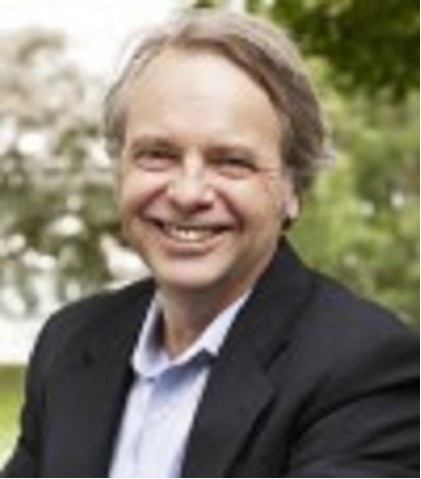 James Smith has run as a candidate in numerous elections – he has managed numerous elections. He has not yet served the public as an elected official. He was on the driving forces in the rescue of the Freeman Station and has delegated to city council on numerous occasions. He has close to the world’s worst collection of limericks. James Smith has run as a candidate in numerous elections – he has managed numerous elections. He has not yet served the public as an elected official. He was on the driving forces in the rescue of the Freeman Station and has delegated to city council on numerous occasions. He has close to the world’s worst collection of limericks.

 By Ray Rivers By Ray Rivers
April 8, 2016
BURLINGTON, ON
Please don’t think that because I criticized Ontario’s Premier for holding special access fundraising events – that I’m responsible for her changing her mind on this delicate matter.
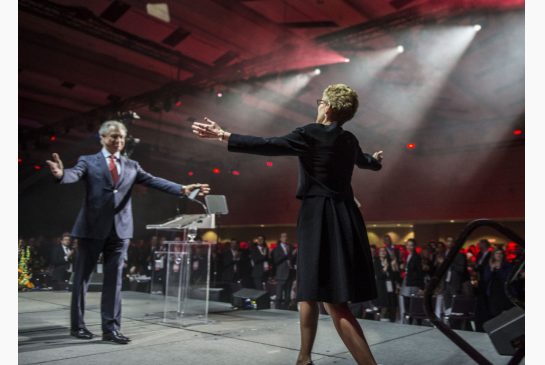 A live in between the politicians and the business interests. We know that Premier Wynne had been thinking about this for some time. But I am pleased to see she is finally reacting: cancelling all ministerial fundraising events, phasing out corporate and union donations, limiting individual donations, and putting rules around third party advertising during elections.
The Premier has promised to consult with the other provincial leaders on these election finance reforms, so the ink is far from dry on the changes. But the Conservatives, under their new leader Mr. Brown, seem supportive of her proposed changes, though they are reluctant to give up their own fundraising events. And the NDP can hardly say no, though they must be a little concerned about losing their union financial support.
And to complete the picture, the Province has also announced changes to the way municipal elections are to be run. New rules will enable municipalities to use ranked ballots and to ban corporate and union contributions to municipal electoral campaigns, as the City of Toronto had done years ago. This enthusiasm for improving local democracy does, however, begs a question. If these changes are such a good idea, why not just mandate them rather than leaving it up to municipal councils to voluntarily implement?
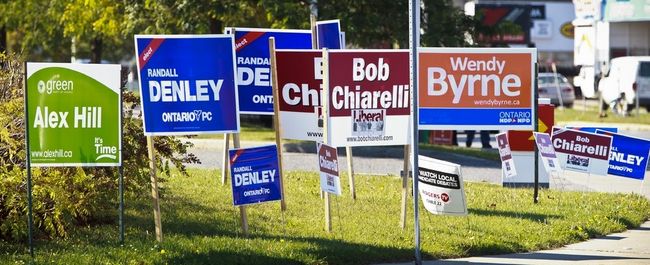 Is the public ready for ranked ballot elections and will they press their councils in the municipalities to implement them? Incumbents in municipal councils are typically the default winners at election time. So don’t expect them to be in a hurry to revamp a system that keeps them in power. Without political parties, many voters see local elections as a crap shoot, since they typically aren’t aware of what each candidates actually stands for – so vote for the incumbent. A ranked ballot may not change that, nor change the frequency of incumbent re-elections. But those who do get elected will have broader public support as a first, second or third choice.
And, if ranked ballots will enhance local democracy, why not implement ranked ballots for Ontario’s provincial elections as well? And why isn’t the Premier joining fellow Liberal Justin Trudeau in his search for an electoral process to better serve Canadians? Harmonizing Ontario’s electoral process with Canada’s can only make voters more comfortable with the voting process, and perhaps encourage more voters to come out on election day.
Jean Chretien has a place in Canada’s history books for at least two reasons. First, he kept Canada out of the disastrous invasion of Iraq. And second, he revolutionized federal election finance rules. Those rules were so well-founded that his arch foe, Mr. Harper, largely continued them, in fact strengthening the prohibition on corporate and union contributions. And we know Chretien got it right because even the Globe and Mail, in a recent editorial, has called on the provinces to adopt the federal election financing rules as their own.
Of course Mr. Harper couldn’t leave well enough alone. The very notion that government would actually fund the operation of political parties is anathema to neo-conservatives. So no sooner had he obtained his majority, than he ripped the heart out of Chretien’s package by killing public financing as a partial alternative to financing with private donations. And then he once again increased contribution limits. It didn’t matter that political deductions cost the government more in lost revenue than it would have to pay for the public financing alternative.
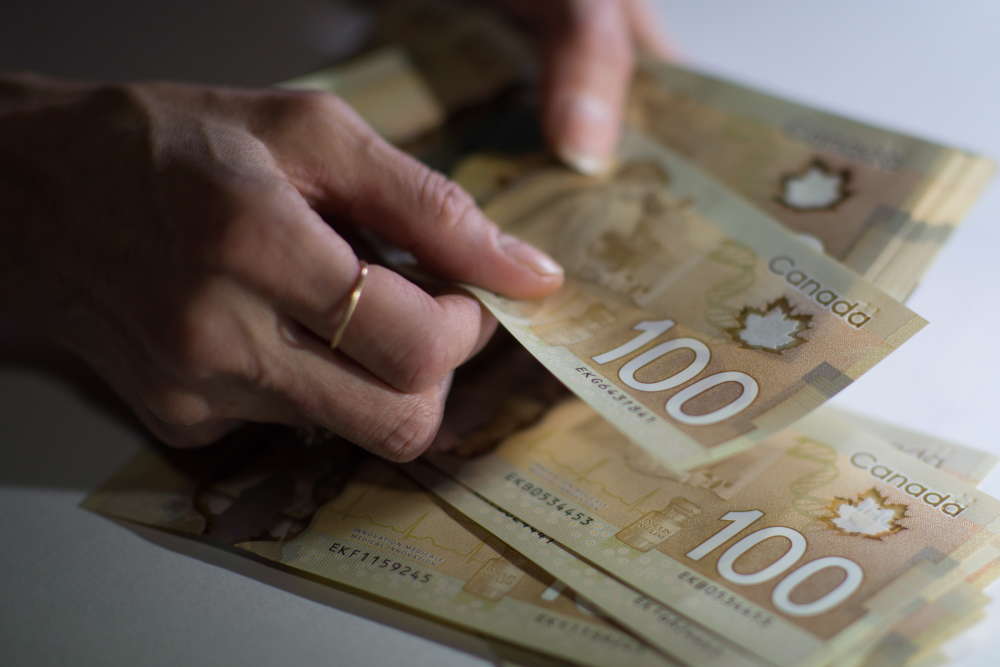 How many donations are paid in cash that is stuffed in large brown envelopes? Not only is public financing a more equitable and efficient way of allowing political parties to continue to serve Canadians, it is the only way to effectively put a stop to the political gravy train. That is right, big donors give money because they believe that buys them influence, and if you’re not a big donor…?
The system will always be tilted in favour of those with fat cheques going to the party war chest which best reflects their needs, unless we put a stop to it. And as to fairness – as one reader noted, political contributions receive higher income tax deductibility than do charitable donations.
Even before the recent Liberal sponsorship scandal, politics in Quebec was often associated with corruption. Whether perception or reality, the provincial government has reacted to that issue by limiting annual political party donations to $100 – a model for the rest of the country I believe.

Rivers will be away for a few weeks travelling in the Ukraine doing research for his next novel. His first book, “The End of September” , is available on Amazin. Ray Rivers will return to his weekly column on both federal and provincial politics, applying his more than 25 years as a federal bureaucrat to his thinking. Rivers was a candidate for provincial office in Burlington where he ran as a Liberal against Cam Jackson in 1995, the year Mike Harris and the Common Sense Revolution swept the province. Rivers is no longer active with any political party.
Background links:
Corruption – Evils of Fundraising – End of Fundraising – Third Parties – Selling Access to Decision Makers –
Wynne Cancels Fundraisers – Political Financing in Canada – Quebec Contribtion Rules – Municipal Elections –
Ranked Ballots – How Ranked Works –

 By Ray Rivers By Ray Rivers
April 1st, 2016
BURLINGTON, ON
The question no one seems to be asking is whether Burlington really needs another waterfront pier. Sources distant from both the PM’s people and those of the Premier have indicated some kind of an announcement is forthcoming in the near future.
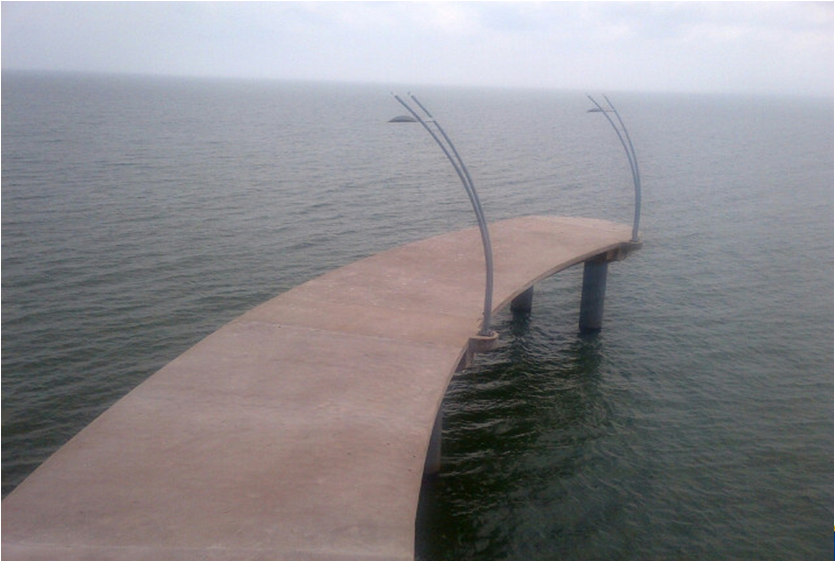 Upon completion of pier number two will reach well into the lake The potential cost of this project could total close to four billion big ones and would be funded through a new infrastructure fund. “What better way to use our federal and provincial deficit money than to create new jobs, right here in Burlington,” one source was overheard mumbling.
The mayor has been very closed-lipped about this initiative. That may be because a former Burlington mayor had been thought to be working hard between the sheets to create this baby. And some baby it will be. A mega-motel, to be named after former city and regional counsellor Robert Bates, will anchor the attractions on this artificial piece of land reaching out into the middle of Lake Ontario.
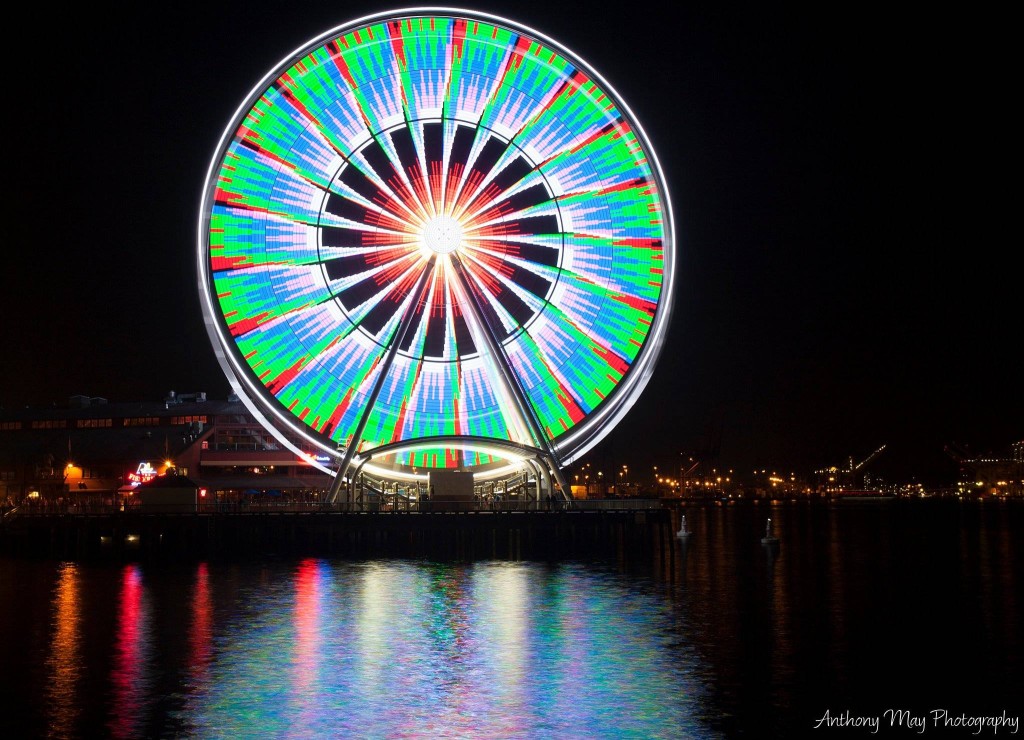 The ferris wheel on pier number 2 will be visible from Toronto. The project will also feature the largest ferris wheel in North America named in honour of the former Toronto mayor, whose brother Doug, had been promoting a similar icon to dot the Toronto skyline. Doug Ford, who always wanted to be known for, and as, a big wheel himself, couldn’t be reached for comment.
However, somebody on somebody’s staff noted that the Fords had always supported using somebody else’s money to move people around, so long as it didn’t get in the way of Toronto’s grid lock. In fact the former Toronto Councillor had hoped that the ferris-wheel could be directly connected to Toronto’s expanding subway system.
Stretching out two and a half kilometres into Lake Ontario the centrepiece of the structure will be a huge ferry docking station with access to planned ferry ports as distant as Oakville and Hamilton and the existing Burlington pier. There will be a 30-hectare amusement park on the water, which will include the ferris wheel and thirty-seven Tim Horton outlets. In addition plans may include a waterfront zoo featuring elephants, lions, penguins and other native Canadian wildlife.
Already, ribbon cutting is being projected to coincide with the 2018 Sound of Music festival which would see a switch in content to such classical pieces as Handel’s Water Music, rather than the heavy rock known to incite wave action. However, given the size of this project, the grand opening may have to be postponed once or twice – or several times.
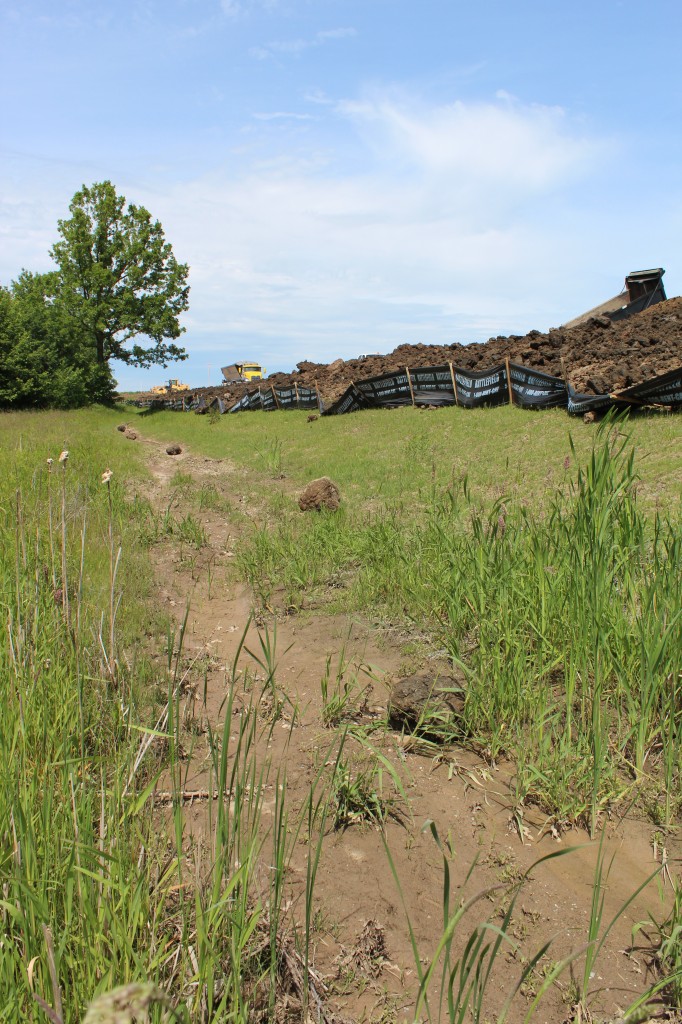 Land fill at the Burlington air park being trucked to the pier number two construction site. Land-fill for this massive project is expected to come from the levelling of Halton Conservation Area’s Rattle Snake Point. Rock climbing activity has severely eroded the rock face and Milton has been reported petitioning the provincial government and Green Belt commission to make way for even more residential housing in Canada’s fastest growing city. And besides the rattle snakes are all gone, the last one seen on March 17th.
Lawyers from around the problem are looking for a way to legally move the land fill on the air park property to the lakefront.
Not everyone will be pleased with this new development and you can be sure that the Burlington Gazette will be sued and have to shut down at least five or six times in the course of this project.
But the proponents are keen to see the pier built and even keener to give its ferris wheel a spin. They have been heard to say that they personally anticipate this to be a very rewarding venture.
Rumours abound about the siting of multi-unit condos as well, adding as many as fifty thousand new residents to the man-made peninsula.
And as is always the case with innovative ventures, even at this early stage, there are the critics.
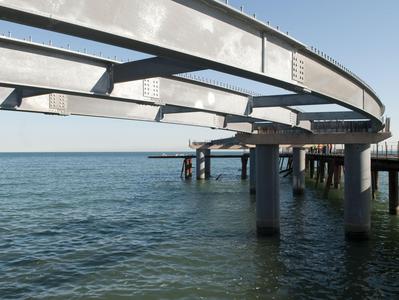 Steel for pier number two was imported from Mexico – the city took this retaliatory action when Hamilton refused to sell the Lasalle Park water lots at a reasonable price. Some folks can’t help but compare this initiative to what they saw as wasteful spending by the federal Conservatives in the wake of the 2009/10 recession and in preparation for the G20 summit. They cite the expensive network of sidewalks Tony Clement built in his rural northern riding which no one actually uses. And then there is the massive effort that went into constructing Canada’s sixth great lake – right there on the shores of Lake Ontario.
In the words of Burlington Gazette publisher, Pepper Parr, who is believed to be a strong proponent himself, despite his denials, “they pissed away all that money back then and got re-elected, so why not this, now? Besides how better to employ all our adopted Syrian refugees looking for work, and where better to offer them a place to live?”
 Rumours abound that the Gazette has been approached about locating its new international headquarters adjacent to the Bate’s motel complex. When asked to confirm that story, Parr responded that he couldn’t confirm or deny his involvement. “It would be like stabbing the mayor in the back,” he was heard to mutter before turning his head away to suppress a giggle. Rumours abound that the Gazette has been approached about locating its new international headquarters adjacent to the Bate’s motel complex. When asked to confirm that story, Parr responded that he couldn’t confirm or deny his involvement. “It would be like stabbing the mayor in the back,” he was heard to mutter before turning his head away to suppress a giggle.

Ray Rivers writes weekly on both federal and provincial politics, applying his more than 25 years as a federal bureaucrat to his thinking. Something special happens to Rivers on the first day of April each year.
Our apologies for his excesses.
Tweet @rayzrivers
Existing Pier

 By Bob Wood By Bob Wood
March 31, 2016
BURLINGTON, ON
This article isn’t for everyone – it gives you a look at the way city council and its citizens used to go at each other. When writer Bob Wood completes the telling of this tale we will pass it along to you.
Citizens, developers and many municipalities have called for it to be dismantled. The Ontario government has given a big “No” to that notion.
Ted McMeekin, the Minister of Municipal Affairs and Housing, told CBC last week that “we need a body like the OMB because sometimes people break the rules.”
So, McMeekin’s Ministry is going to review the OMB with an eye to reform it by foiling those rule breakers. McMeekin is looking for ideas.
He’ll get no help from me. I ought to have an opinion but my views are a bit muddled. That’s likely because I’ve become far too familiar with a long ago OMB hearing. That hearing dealt with an attempt by a developer to put a McDonald’s restaurant in Parkwood Plaza at the corner of Kenwood and Lakeshore in south east Burlington. There were three OMB hearings for that event.
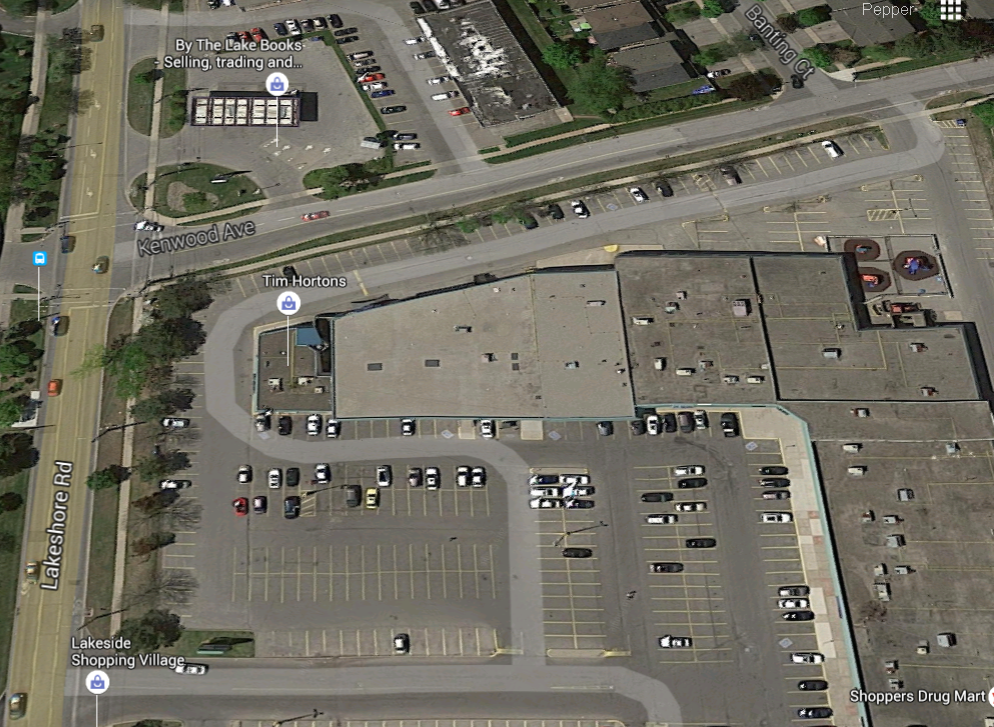 Would the community fight the location of a fast food outlet today? The residents spent more than $350,000 in legal fees and those were 1980 dollars At the end of the third hearing a resident’s group was successful in blocking this inappropriate use of a small plaza. Their success came thirty-six years ago this Friday (April 1, 1980).
Burlingtonians are patiently awaiting a decision on the Councillor Dennison appeal of a Burlington Committee of Adjustment decision to not allow a property severance he was seeking. The hearing took place more than nine months ago.
There is a second OMB appeal that has many in Burlington interested – that being the appeal the ADI Development Group took to what they called a refusal on the part of the city to make a decision on their development application to put up a 26 storey tower on the corner of Martha and Lakeshore Road.
After giving the city a bit of a bum’s rush on their original application – Adi then asks the OMB officer hearing their appeal to postpone the actual hearing while they talk to the city about how an additional piece of property they recently purchased is going to fit into their development.
This stuff does get complex.
The seven year battle details some of the barriers residents faced in trying to cover the costs of an OMB appeal.
Some of the Cast of Characters
Jim Ryan – east end resident and frequent spokesperson for residents. Later elected as City Alderman for Ward 8.
The Committee Against The Establishment of a Restaurant in Parkwood Plaza (CAERPP) – residents’ group.
Herman Turkstra – well known lawyer and former Member of the City of Hamilton Board of Control.
Doug Brown – Solicitor for the City of Burlington.
Joan Allingham – Chair of Council’s Development. Perhaps better known now as Joan Little, columnist for the Hamilton Spectator.
Dalewest Construction – Owner of Parkwood Plaza.
For many years the City of Burlington’s Community Services Committee had convened a January meeting to consider funding requests. Typically, the requests came from recreational, sports or cultural groups.
Three sessions of the committee would be held in 1979 to look at 35 requests totalling $386,164.
The January’s meeting of that committee was to consider a request from a resident’s group. The Committee Against The Establishment of a Restaurant in Parkwood Plaza (CAERPP): they wanted help to foot a portion of their legal bills.
After an in camera meeting the Committee determined in a 3-2 vote that CAERPP should receive $7,500 for their legal costs.
This was a first – a request from a citizen’s group fighting a development proposal.
Mayor Roly Bird, who had been recently elected, defended the decision to fund the citizen’s group saying: “We have been given to understand that the city’s case will be greatly enhanced by their continued participation.”
Bird proposed a $7,500 grant as a compromise after an earlier motion for more money by Alderman Linda Pugsley had failed, receiving support of only one other member of the committee, Walter Mulkewich of Ward One.
Mayor Bird was known as a man of strong opinions. So there must have been many surprised citizens when six days later he had a different one.
Bird told Council that “a number of advisers” he had in the in the city told him they did not support paying the residents’ lawyer.
“I don’t feel the city’s case and the residents’ case will be that much jeopardized by the non-participation of their legal person.”
A strange statement indeed. Bird continued: “We have to ask is this the City’s fight.”
With that Council rejected the position of its Administration Committee.
Ward 8 City Alderman Bill O’Connell called Council’s position “pitiful.”
Other Council members claimed that if the City joined with CAERPP they could expose the city to legal action.
“The City could have been liable for many thousands of dollars for last revenues by Dalewest and McDonald’s,” Jim Grieve claimed.
Others, like Joan Allingham and Rob Forbes disagreed that such an opinion had been offered.
On becoming aware of the City’s rejection of financial support for his group, Jim Ryan had sharp words.
“The mayor indicated that the city is well qualified to handle the situation. Maybe we’ll just let them handle it.”
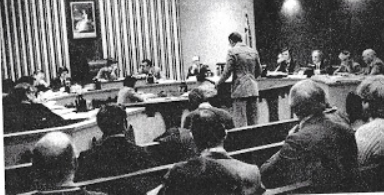 City Council chamber decor hasn’t changed all that much. The picture of the Queen has been replaced by the city crest. And there are a lot more council members at that table Ryan went on: “I wish I had as much confidence in them. They blew it last time and they’ll blow it again. They don’t have the specialized expertise McDonald’s and Dalewest have.”
What now? Alderman O’Connell thought that the residents would end their fight.
The residents convened the night after Council’s decision. “It was a hell of a blow,” Ryan told the Spectator.
The committee had already accumulated $13,000 in legal bills and the meter was still running. What fundraising opportunities were still open to them? More garage sales, dances?
“That’s a hell of a lot of dancing and garage sales,” said Ryan to the idea of raising $8,000 more.
The group decided that a lottery could bring in money and be an indication of broader community support. CAERPP members began to sell tickets for a Valentine’s Day draw. First prize would be $500.
The Committee knows they need lawyer Herman Turkstra, who they had engaged a year earlier.
While the City’s position was similar to the residents, the city’s lawyer can’t really represent the residents’ interests.
“We need our own solicitor. To be successful, the city needs our lawyer,” Ryan asserted. It wasn’t just Ryan who felt this way.
Alderman O’Connell talked to city solicitor Doug Brown and came away feeling the City has little hope. “If the residents pull out we might as well forget it.”
As lottery tickets were being sold speculation continued as to what the City should do. The Burlington Post editorialized that if sufficient funds were not raised in the lottery the city had to make a choice. Would they mount an effective opposition to McDonald’s/Dalewest and could it present the necessary arguments “without leaving itself open to future confrontation?”
he Post seemed to think that this was about property values. In their view, the city would put itself in a bad spot if it argued that putting a McDonald’s in the plaza would lower property values. The Post misunderstood the issue as did many citizens then and now. While residents are concerned about such things as property values, the OMB and municipal planning in general are not.
But the residents had no intention of giving up. Perhaps other Burlington observers thought as much. “There was no intimation we’d drop out, even if we had to go without our solicitor,” said Ryan.
Advertisements for the continuation of the hearing ran in the Post on the same day that another story broke. Now the province was going to review the legality of CAERPP’s lottery. Lawyers for Dalewest Construction had written the Ontario Lottery Corporation (OLC) claiming that the lottery had contravened Ontario’s regulations.
Don Speight, assistant to the director of the OLC, said that a lottery must be for charitable purposes. It must go for relief of the poor, the advancement of education or religion or “any purpose that is of benefit to the community.”
While the OLC’s investigation was going on, lottery organizers were told not to spend any of the lottery’s proceeds. CAERPP had put down $14 for the licence in November although there were some questions about it at the time.
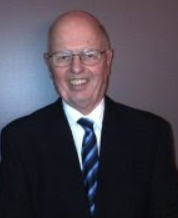 Doug Brown was the city solicitor during the seven year citizen’s battle to prevent a McDonalds from being located in the east end plaza. “When they first came to me I was not prepared to issue a licence,” claimed City Clerk Don Briault. But City Solicitor Doug Brown said it was legal.
Three thousand, two hundred and thirty-two (3,232) one dollar tickets had been sold to people who, Ryan said, bought the tickets to help with the legal bills. From Ryan’s perspective the draw was legal because the city had licensed it, Dalewest’s complaint could result in the money being handed over to a charity. People would be angry.
“They did not donate to a charity or a religious organization, they donated to cover our legal expenses,” said Ryan.
With the OLC studying the matter one might have expected silence from government officials. Not so. A spokesman for the Ministry of Consumer and Corporate Relations told the Burlington Post that the lottery was probably illegal.
“Let’s face it. I’ve never heard of a lottery licence being issued to a group espousing a political viewpoint,” said Ed Ciemigap whose department was apparently exploring legal precedents.
Turkstra was incredulous that none of the parties involved in the determination of the lottery issue had contacted the residents.
“The Ministry seem to have the idea the (citizens) group is engaged in a political process. What they are doing is supporting the position of the City.”
Soon (March 21st) the Attorney General’s office told the Post that the chances of CAERPP being charged were fairly remote.
“Presumably Turkstra and his clients have nothing to worry about,” Julian Polika ventured.
And that is as far as Bob Wood, who grew up not far from the Parkwood Plaza. He hopes to have the whole story complete later in the spring.
Editor’s note: Bob Wood is working on the completion of this story. Things don’t change all that much in local politics – do they? Developers still do whatever they think they can do to get their projects completed.
And where is city council when it comes to supporting the citizens; there are a few in North Burlington that would like to see the city being proactive on their side over the dumping of land fill on the air park property.

 By Pepper Parr By Pepper Parr
March 28, 2016
BURLINGTON, ON
The city is bedeviled with what to do about parking – there are those who feel a parking spot is supposed to open up for them in exactly the place they want to put their vehicle. Many seem blind to the impact their vehicles have on the environment and even though they have more disposable income than they could possibly spend they howl over the cost of parking.
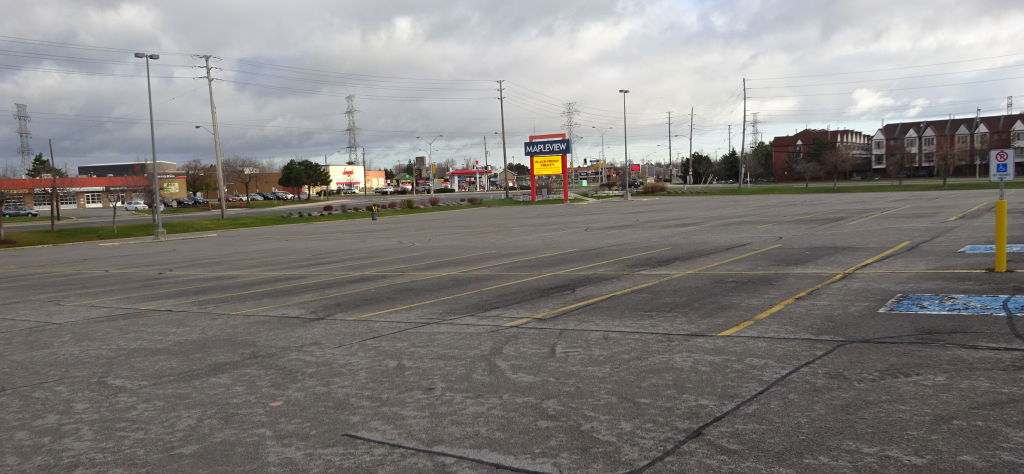 There are times when you can’t get a parking spot at the Mapleview Mall where there are acres of parking space. Is there a solution? We need one. The city has two malls –one with fields of parking that are covered in asphalt that creates significant storm water management problems. The city owns more than half a dozen parking lots plus a multi-storey tower downtown that is rarely full. Developers are putting up structures for people who may well not require the amount of space the city rules require them to build – but the rules are the rules.
 Could we begin freeing up some space and creating spots for just these little guys? Many of the cars on the road these days are not as big – two could fit in the parking spots now underground but the rules don’t permit much flexibility.
The city has thousands of homes with garages – but residents complain about parking space because their garage is used as storage or a workshop.
The city does have some issues with parking – the biggest of which is public attitude.
The department of transportation is holding an Open House to gather public opinion as they work towards a major review of what the parking standards should be for the city.
Vito Tolone, the recently appointed Director of Transportation, has been around parking most of his municipal career – he knows what he is talking about. He does get a little excited at times during presentations but if you listen to him and pay attention to what he has to say – you will find he is usually right.
This project he is overseeing with the aid of the IBI Group who are serving as consultants to the city is to develop parking standards that:
• Are clear, defendable, and based on sound technical analysis;
• Recognize differences in existing land use and support the envisioned urban structure;
• Encourage transportation alternatives to the personal automobile, where available;
• Support efficient forms of development in terms of costs and land requirements; and
• Balance the needs and concerns of a diverse set of stakeholders including City staff, (who happen to get free parking for their cars), developers, businesses, ratepayer groups, TDM organizations, and the general public.
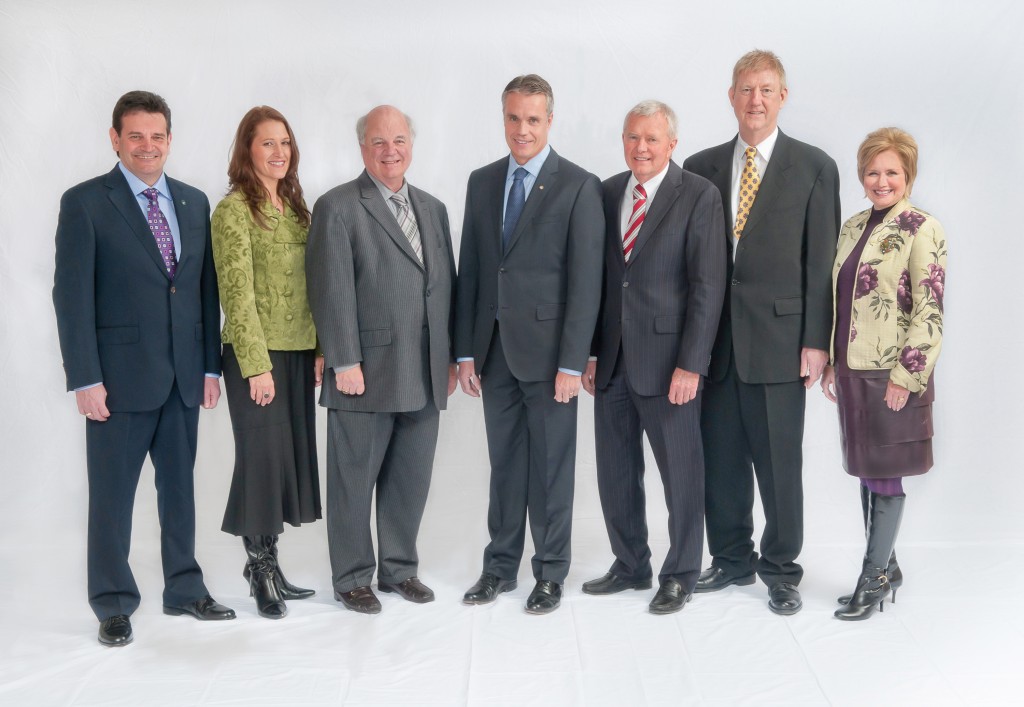 This is the crew that is going to have to look at the staff report and then stand up and do the best thing for the people that put them in office – that will call for them to work ad a team – not something that is seen very often. Lessons learned in previous studies point to the following key success factors: There has to be support at a very high level – city Councillors have to be behind any changes.
There has to be a willingness to accept at least a degree of change, which amount to some political courage and real leadership. Burlington has always been a little short on political courage.
There has to be a balance of technical analysis, best practices and policy guidance. That policy guidance comes from staff based on the data they collect and the advice they get from the consultants the hire.
Potential Challenges include: Collecting data for wide range of uses; obtaining data from private residential properties; developer input (the developers have to be responsible and pay at least some attention to the greater good and not just their bottom line.
There may be a disconnect between the ideal future standards and current behavior (truer words have not been written. Finally, phasing in parking standards is difficult.
Key Issues for Study
• Parking issues differ across user groups and land uses
• Balancing the needs and concerns of a diverse group of stakeholders is a concern
• The city anticipates parking pressure from downtown redevelopment.
• The unclear future of emerging trends in transportation technology and their impacts on parking requirements is not something easily known.
The consultation process is:
• To gain an understanding of the issues that residents, business owners, developers, etc. face in regard to parking and parking standards;
• To gain an understanding of the potential effectiveness of changes to parking standards in making more efficient use of parking, supporting transit-oriented development, and other policy objectives; and
• To gain buy-in from the business and development community, ratepayers, and other interest groups on proposed parking standards.
With the Strategic Plan about to get a blessing from city council staff will begin to fit the role transportation is going to play in the way Burlington will get grown during the next 25 years.
Work on the Official Plan can go forward with more precision now that the Strategic Plan is in place. The Transportation Master Plan will get re-shaped and not exist as a plan that does not fit in tightly with everything else. This is going to be a new experience for the bureaucrats – city manager James Ridge has made it clear that his approach to managing the growth of the city is to always be looking at the complete picture.
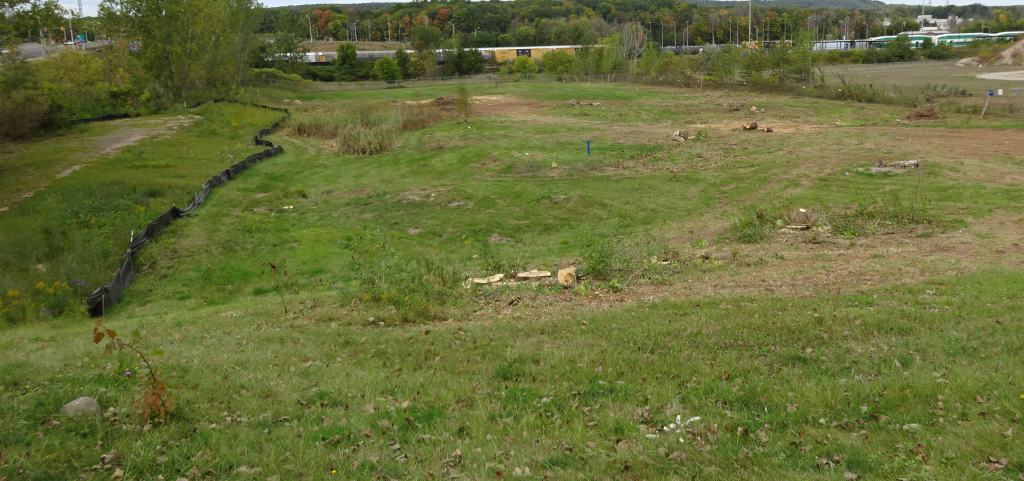 It’s an empty field right now – in a very short period of time it will be a very busy construction site with stacked townhouses and apartment/condo towers – with not that much in the way of public space. All being done legally. The city has come to the conclusion that it will have a number of mobility hubs and appear to be being forced by a developer in the west end to go with the Aldershot GO station as the first hub – even though for the sake of the city – Aldershot may not make the most sense.
 The Station West development yards from the Aldershot GO station is being actively marketed by the Adi Development group. The problem is a developer is racing ahead with plans that the city has to climb on board with or get left behind. Quite how Burlington got itself in this bind is going to take some analysis – and if there are planning tools that can give the city more leverage – someone better find then and learn how to use them quickly.
Wednesday night the public gets a chance to make its views known. We need to do this right the first time – once decisions are made – there is no going back. We haven’t done all that well with transportation issues in the past.

 By Ray Rivers By Ray Rivers
March 25, 2016
BURLINGTON, ON
If you want to make money, you have to spend money. And that pretty well sums up the 2016 federal budget – it’s about re-investing in Canada and Canadians. Hardly revolutionary, this economic plan is corrective and moderate in its measures – a first step in the right direction.
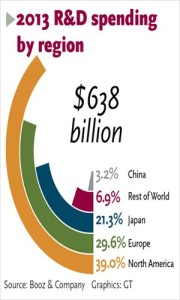 While outdated the graphic does show the impact research and development spending has on an economy. There is investment in transportation infrastructure, something which will improve our productivity, particularly in built-up areas like the GTA. There is some modest spending to improve access to education, particularly for the underprivileged. And there is a huge push to restore levels of R&D, innovation and science, which had been allowed to lapse over the last decade.
Changes to the income tax code, already in the works, modestly favour the middle class over the wealthy. This is more than an attempt to arrest and correct the growing spread between the rich and the poor; this is sound economic policy. It’s called the marginal propensity to consume – redistributing income from the wealthy increases domestic spending, driving consumption and investment, and consequently economic growth.
There is no question of the social dimension of this budget, which invests heavily in people, particularly the disadvantaged. Veterans complaints about neglect are addressed. More child care money will be going to the lower income parents who really need it. Canada’s first nations are given the opportunity to catch up to the rest of us. And age of seniority has been rolled back to 65, at the same time as greater assistance is provided to those seniors in need.
 Perhaps the bigger questions is – will the country be affected by the pipeline? There is investment in the environment as well. So we’ll see our national environment assessment process restored. Ironically that might expedite the construction of the Energy-East pipeline, as that is a precondition for Quebec’s consent. And the Prime Minister has solidified his commitment to put climate change money on the table to help motivate Canada’s Premiers to action.
The price tag for this budget comes in at just below the thirty billion deficit that everyone was expecting. The largely muted response to the size of the deficit is the result of a government which has shown its ability to manage expectations, and, of course, the promises made during the last election. Only the interim leader of yesterday’s government couldn’t resist the temptation to dump on the budget.
30 Billion dollars is a lot of money, but even after another four years of deficit, Canada will still have the lowest debt-to-GDP ratio in the G7, and half the level of the US or the UK. Moreover, if the annual deficit projections in the budget bear out, relative debt levels will shadow the debt performance of the preceding government, making Ms. Ambrose’s complaint at best a case of the pot calling the kettle…
And not everyone will benefit from this package. New toys for the military are on the back burner, reflecting a lower immediate priority. There could have been more income re-distribution, even greater support for our cultural industries and a faster path for infrastructure development. But you can’t do everything. We also know that more money will still be needed for a new national health care charter and enhancements to the Canada Pension Plan, initiatives on a different timetable.
 There are thousands of small solar panel installations like this across the province – they work very well and in many cases provide revenue for the owners. The budget represents a necessary investment to return Canada to a more balanced, engaging and innovative economy. The fossil fuel era has itself becoming fossilized. Coal has left the station and oil is following suit, being replaced everywhere by renewable energy. Those were yesterday’s ideas promoted by yesterday’s short-sighted leaders.
Canada’s future lies in its potential as a balanced diverse economy. Its strength lies more with our human than with our natural resources. This budget helps us move in that direction by promoting education, science, industry and clean energy. If you get stuck in the past you’ll miss the future.

Ray Rivers writes weekly on both federal and provincial politics, applying his more than 25 years as a federal bureaucrat to his thinking. Rivers was a candidate for provincial office in Burlington where he ran as a Liberal against Cam Jackson in 1995, the year Mike Harris and the Common Sense Revolution swept the province. Rivers is no longer active with any political party.
Background links:
2016 Budget in Full
Highlights
Deficit
More Deficit
Criticism
More Criticism
Analysis
An Easy Sell –

|
|
 By Ray Rivers
By Ray Rivers




















































 In the absence of more detailed information one can only speculate – but it might be that the procedures that doctor used can now be performed more rapidly and efficiently than when the billing rate was set. That would allow more patients through the turnstile and into the cash register. And in that case the Minister has a valid point that the rates need to be revised downwards to better reflect the real cost of that medical service.
In the absence of more detailed information one can only speculate – but it might be that the procedures that doctor used can now be performed more rapidly and efficiently than when the billing rate was set. That would allow more patients through the turnstile and into the cash register. And in that case the Minister has a valid point that the rates need to be revised downwards to better reflect the real cost of that medical service.




 On the main floor, near the exit, sits a military truck, riddled with bullet holes, as if it were placed there to tease the attendee. Sure enough around the corner is a room dedicated to the over 2000 soldiers who had recently been killed in the Donbas. And that wasn’t counting the civilians or the number who’d been sacrificed on the other side, including those of the Russian regular army. A war without purpose and seemingly without end.
On the main floor, near the exit, sits a military truck, riddled with bullet holes, as if it were placed there to tease the attendee. Sure enough around the corner is a room dedicated to the over 2000 soldiers who had recently been killed in the Donbas. And that wasn’t counting the civilians or the number who’d been sacrificed on the other side, including those of the Russian regular army. A war without purpose and seemingly without end. Does it really matter that Ukrainians speak Russian as well or even primarily instead of Ukrainian. Aren’t they still Ukrainians. Polls indicate that to be the case. The international linguist Michael Moser thinks making Russian an official second language would make social harmony worse rather that better. He would just leave well enough alone.
Does it really matter that Ukrainians speak Russian as well or even primarily instead of Ukrainian. Aren’t they still Ukrainians. Polls indicate that to be the case. The international linguist Michael Moser thinks making Russian an official second language would make social harmony worse rather that better. He would just leave well enough alone.





 James Smith has run as a candidate in numerous elections – he has managed numerous elections. He has not yet served the public as an elected official. He was on the driving forces in the rescue of the Freeman Station and has delegated to city council on numerous occasions. He has close to the world’s worst collection of limericks.
James Smith has run as a candidate in numerous elections – he has managed numerous elections. He has not yet served the public as an elected official. He was on the driving forces in the rescue of the Freeman Station and has delegated to city council on numerous occasions. He has close to the world’s worst collection of limericks.





















